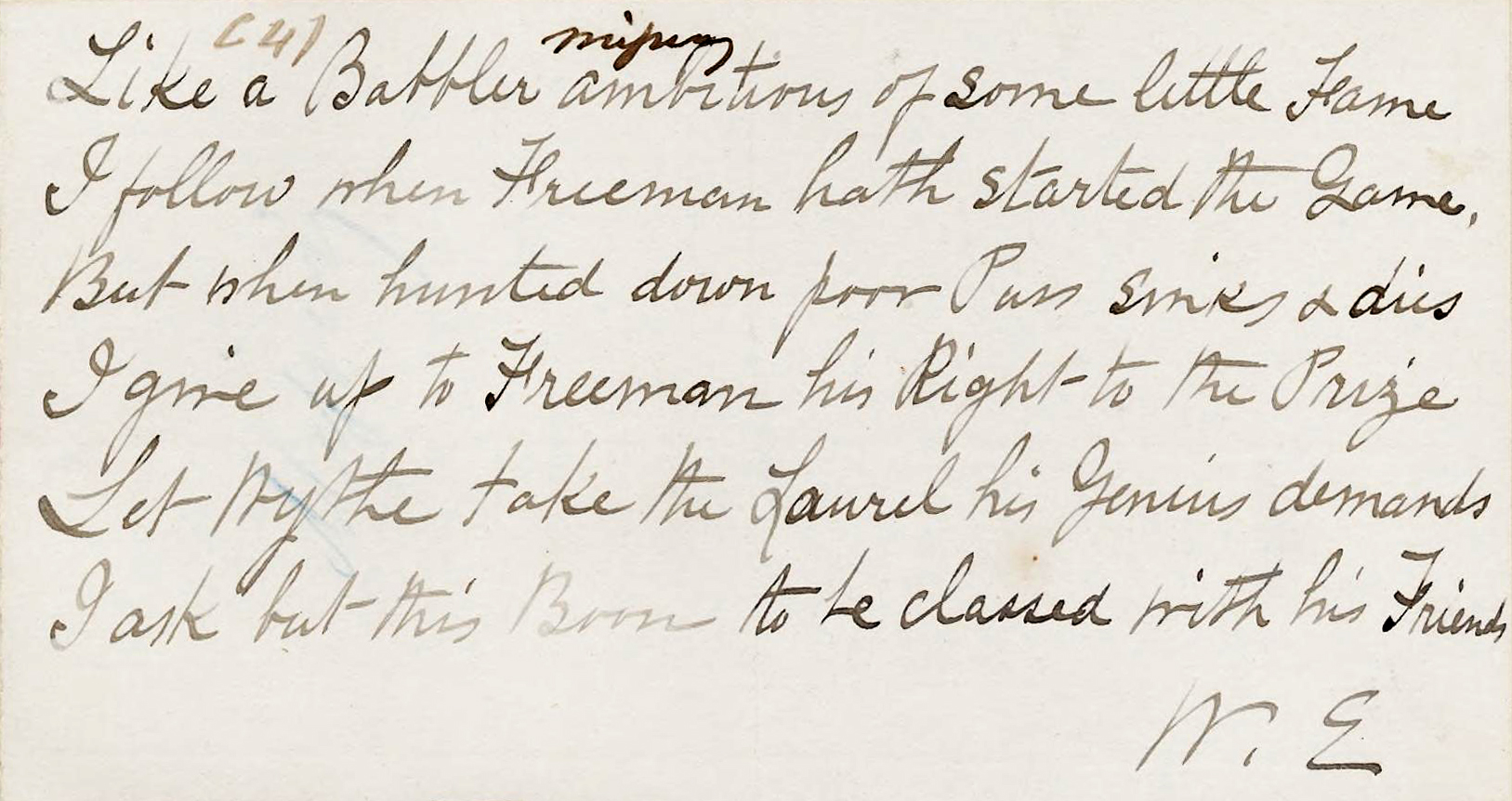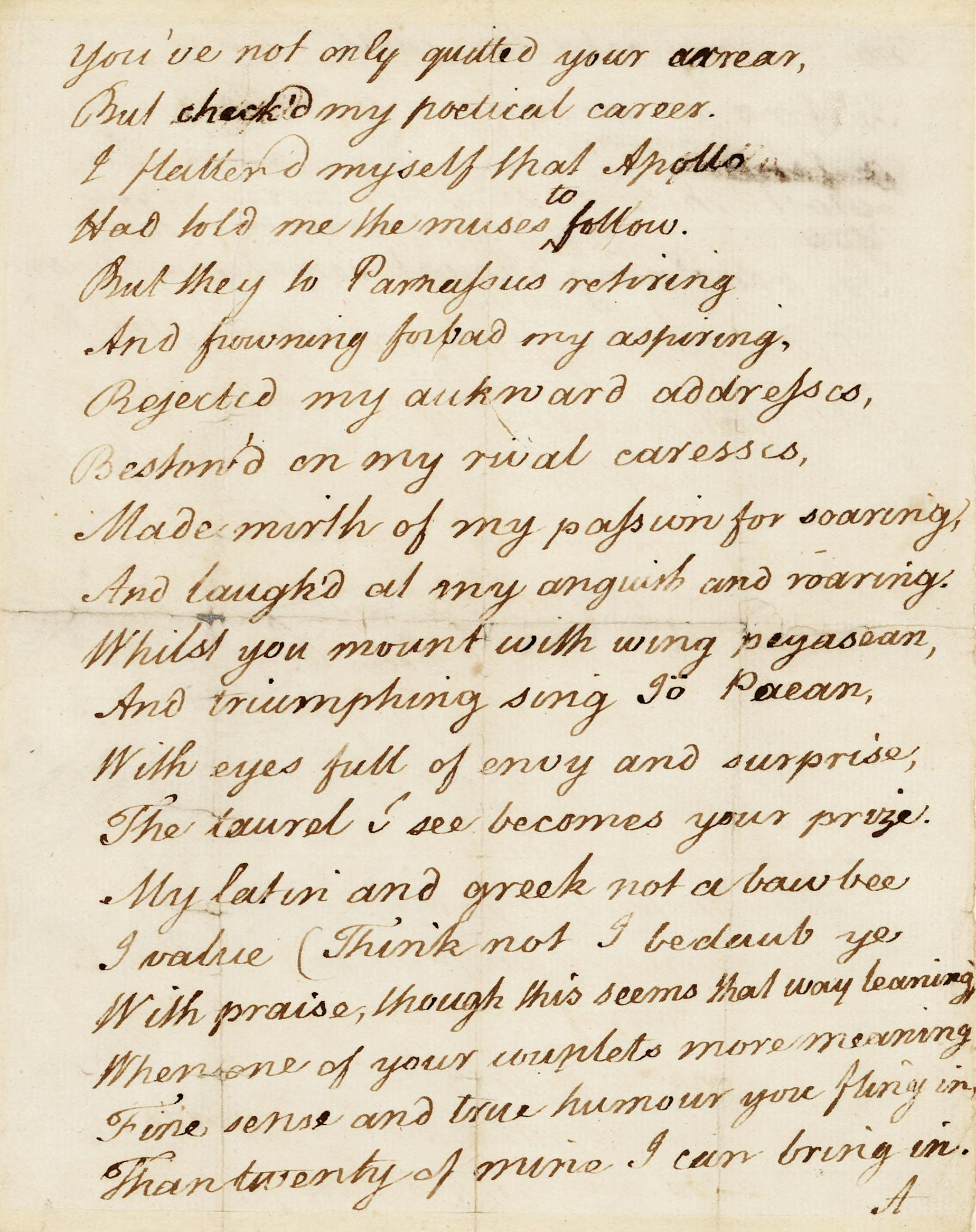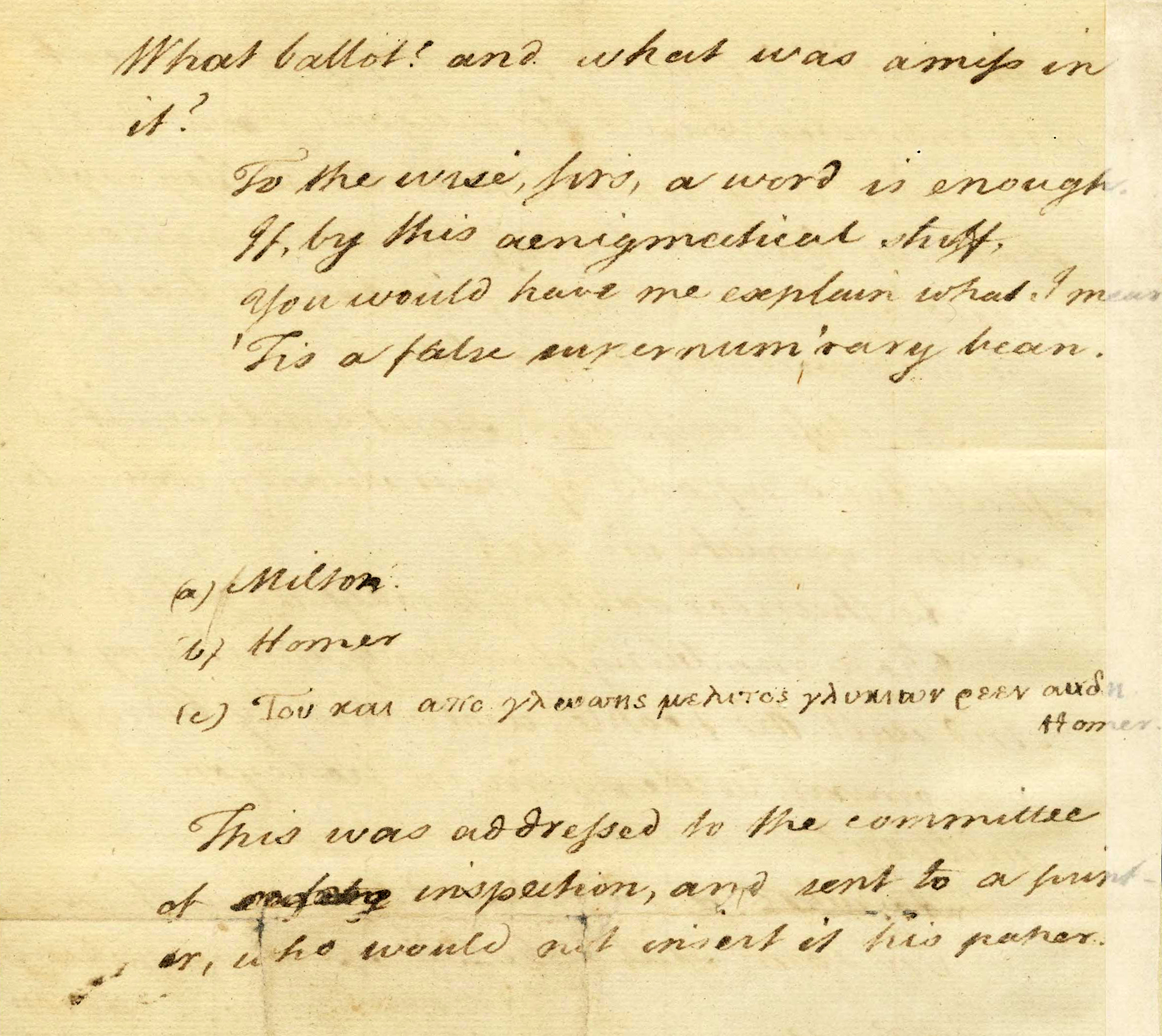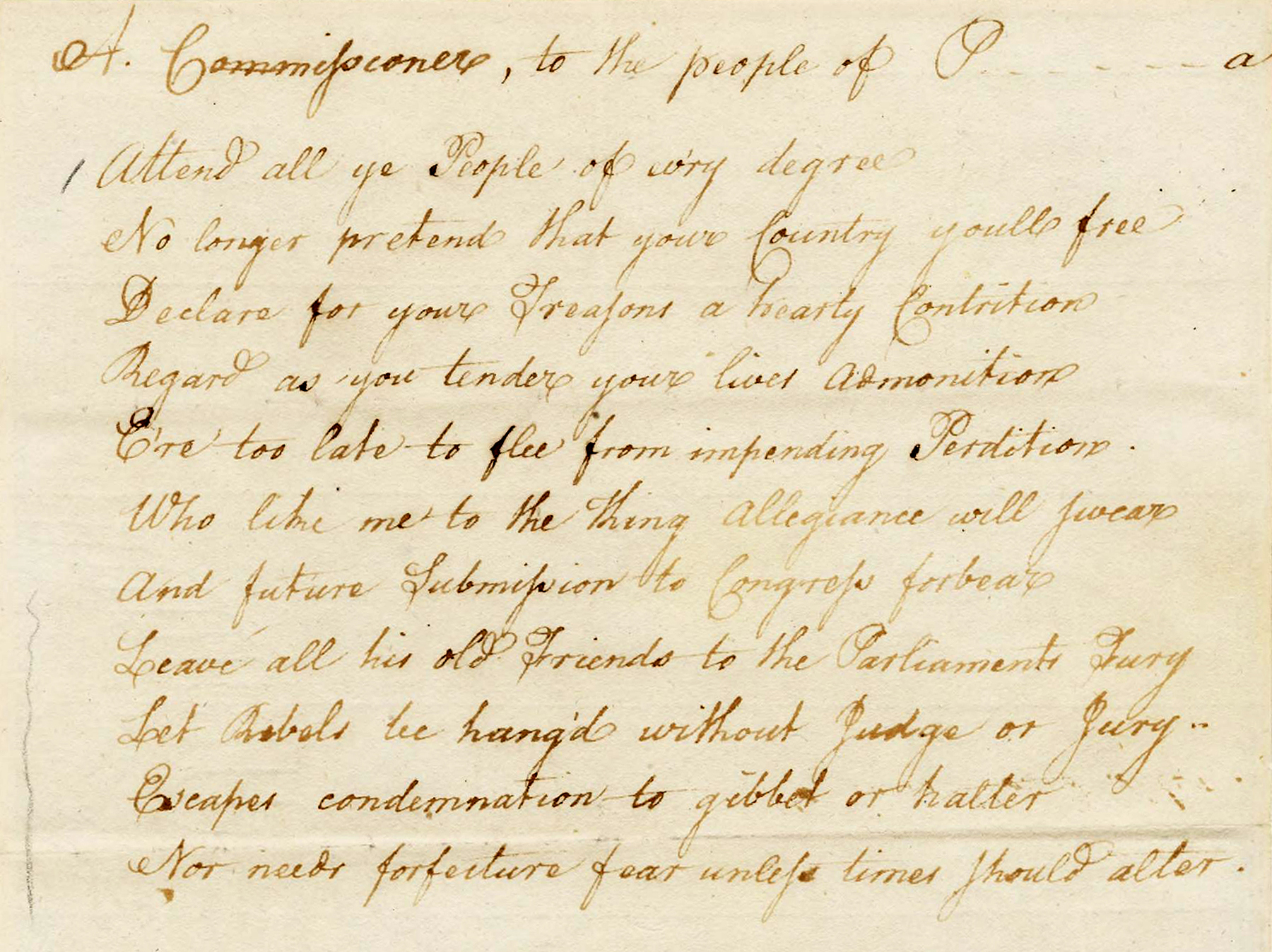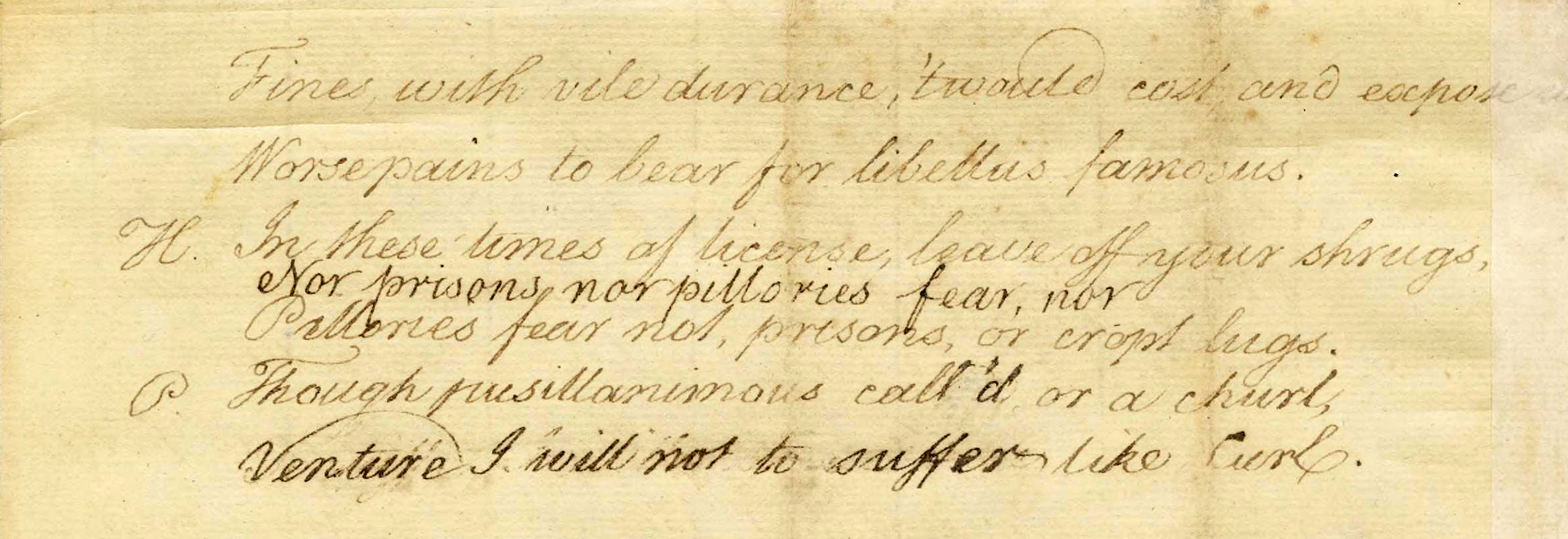Difference between revisions of "Poems on Witty Subjects in Congress"
(→Martial, Epigram XVII, in Wythe's hand) |
m (→Martial, Epigram XII.47, in Wythe's hand) |
||
| (68 intermediate revisions by 3 users not shown) | |||
| Line 1: | Line 1: | ||
| − | [[File:PoemsOnWittySubjectsInCongressP6.jpg|thumb|300px|[[George Wythe]] (VA) and William Ellery (RI) exchanged verses on pieces of scrap paper, as evidenced by | + | [[File:PoemsOnWittySubjectsInCongressP6.jpg|thumb|300px|[[George Wythe]] (VA) and William Ellery (RI) exchanged verses on pieces of scrap paper during [[wikipedia:Second Continental Congress|Congress]], as evidenced by this page, originally addressed to "The Hon. William Ellery, Delegate for the State of Rhode Island, in Continental Congress, Philadelphia."]] |
| − | + | George Wythe returned to the Second Continental Congress in Philadelphia sometime in mid-September, 1776.<ref>The exact date of Wythe's arrival in Philadelphia is not known. Wythe's signature does not appear on a letter from the Virginia delegates to the Pennsylvania delegates dated September 12, 1776, regarding a temporary border between the two commonwealths (Peter Force, ''American Archives,'' 5th ser. (Washington, D.C.: M. St. Clair and Peter Force, 1851) 2:42; but [[wikipedia:Josiah Bartlett|Josiah Bartlett]], in a letter to [[wikipedia:William Whipple|William Whipple]] dated September 14, reports "Mr. Wythe is come to Congress." Edmund C. Burnett, ed. ''Letters of Members of the Continental Congress,'' vol. 2, ''July 5, 1776 to December 31, 1777'' (Washington, D.C.: Carnegie Institution of Washington, 1921), 89.</ref> By November, Congress was facing a split caused by the northern states offering additional pay to their soldiers, which the southern states could neither match nor afford. [[George Wythe]], delegate from Virginia, addressed a short, humorous poem to [[wikipedia:William Ellery|William Ellery]] of Rhode Island, suggesting that the "Yankees" generosity would ruin Congress's efforts. Ellery responded in kind, and the two exchanged verses until Wythe left Congress to return to the Virginia Convention, in December. | |
| + | |||
| + | The manuscripts were recognized in the collection of the [http://www.bpl.org/ Boston Public Library] by W. Edwin Hemphill, who published an article on them in 1952: "[[George Wythe Courts the Muses|George Wythe Courts the Muses: In Which, to the Astonishment of Everyone, That Silent, Selfless Pedant Is Found to Have Had a Sense of Humor]]."<ref>W. Edwin Hemphill, "[[George Wythe Courts the Muses]]," ''William and Mary Quarterly'' 3rd ser., 9, no. 3 (July 1952), 338-345.</ref> | ||
| + | |||
| + | In 2013 the manuscript was digitized by the Boston Public Library, and made available in the [https://archive.org/details/poemsonwittysubj00elle Internet Archive.]<ref>[https://archive.org/details/poemsonwittysubj00elle Poems on witty subjects in Congress (manuscript),] by Ellery, William, 1727-1820; Wythe, George, 1726-1806; Boston Public Library, American Revolutionary War Manuscripts Collection.</ref> | ||
==Manuscript text, November-December 1776== | ==Manuscript text, November-December 1776== | ||
| Line 23: | Line 27: | ||
|} | |} | ||
| | | | ||
| − | [[File:PoemsOnWittySubjectsInCongressP7.jpg|thumb|600px| | + | [[File:PoemsOnWittySubjectsInCongressP7.jpg|thumb|600px|Manuscript endorsed on the reverse as "1st Poem", page seven of [https://archive.org/details/poemsonwittysubj00elle ''Poems on Witty Subjects in Congress,''] from the [https://www.bpl.org/ Boston Public Library's] [https://archive.org/details/bplscarwm American Revolutionary War Manuscripts Collection.]]] |
|} | |} | ||
| Line 37: | Line 41: | ||
Rom. Caths are saved from purgatory,<br /> | Rom. Caths are saved from purgatory,<br /> | ||
So by what the Yankees good are doing<br /> | So by what the Yankees good are doing<br /> | ||
| − | Buckskins will save from utter | + | Buckskins will save from utter Ruin. |
|} | |} | ||
| | | | ||
| − | [[File:PoemsOnWittySubjectsInCongressP3.jpg|thumb|600px| | + | [[File:PoemsOnWittySubjectsInCongressP3.jpg|thumb|600px|Endorsed on the reverse as "To G. Wythe / Answer to / 1.st Poem", page three of ''Poems on Witty Subjects in Congress,'' from the [https://www.bpl.org/ Boston Public Library's] [https://archive.org/details/bplscarwm American Revolutionary War Manuscripts Collection.]]] |
|} | |} | ||
| Line 59: | Line 63: | ||
She too proposes the Mode of Taxation<br /> | She too proposes the Mode of Taxation<br /> | ||
To leave as it was before it was debated<br /> | To leave as it was before it was debated<br /> | ||
| − | For perhaps by this <s>forward</s> | + | For perhaps by this <s>forward</s> mighty Mary<s>'ll</s> be sated.<br /> |
| + | <br /> | ||
Pray, what is the Cause of this Indulgence so great<br /> | Pray, what is the Cause of this Indulgence so great<br /> | ||
| − | Where Discord | + | Where Discord & Jarring subsisted of late?<br /> |
Ill tell you, my Friend, 'tis a truth very serious:<br /> | Ill tell you, my Friend, 'tis a truth very serious:<br /> | ||
Interest will join States of Sentiments various. | Interest will join States of Sentiments various. | ||
|} | |} | ||
| | | | ||
| − | [[File:PoemsOnWittySubjectsInCongressP5.jpg|thumb|600px| | + | [[File:PoemsOnWittySubjectsInCongressP5.jpg|thumb|600px|Manuscript endorses as "Poem Ans — WE / 2d", page five of ''Poems on Witty Subjects in Congress,'' from the [https://www.bpl.org/ Boston Public Library's] [https://archive.org/details/bplscarwm American Revolutionary War Manuscripts Collection.]]] |
|} | |} | ||
| Line 76: | Line 81: | ||
{| | {| | ||
| style="width: 500px; white-space: nowrap; margin: 20px 0 20px 20px; background-color: #f9f7e0; border: 1px solid #000000; padding: 20px 50px;" | | | style="width: 500px; white-space: nowrap; margin: 20px 0 20px 20px; background-color: #f9f7e0; border: 1px solid #000000; padding: 20px 50px;" | | ||
| − | For farms in eutopia, the moon, or some fairyland<br /> | + | For farms in eutopia, the moon, or some fairyland,<br /> |
Compensations more worth were offered by Maryland.<br /> | Compensations more worth were offered by Maryland.<br /> | ||
In this it's denied, Sir, our sister's cross humour'd,<br /> | In this it's denied, Sir, our sister's cross humour'd,<br /> | ||
| Line 97: | Line 102: | ||
|} | |} | ||
| | | | ||
| − | [[File:PoemsOnWittySubjectsInCongressP9.jpg|thumb|600px|Page nine | + | [[File:PoemsOnWittySubjectsInCongressP9.jpg|thumb|600px|Page nine of ''Poems on Witty Subjects in Congress,'' from the [https://www.bpl.org/ Boston Public Library's] [https://archive.org/details/bplscarwm American Revolutionary War Manuscripts Collection.]]] |
|- style="vertical-align: top;" | |- style="vertical-align: top;" | ||
| style="width: 500px; white-space: nowrap; margin: 20px 0 20px 20px; background-color: #f9f7e0; border: 1px solid #000000; padding: 20px 50px;" | | | style="width: 500px; white-space: nowrap; margin: 20px 0 20px 20px; background-color: #f9f7e0; border: 1px solid #000000; padding: 20px 50px;" | | ||
| Line 115: | Line 120: | ||
And spoil us of freedom, most precious of treasures. | And spoil us of freedom, most precious of treasures. | ||
| | | | ||
| − | [[File:PoemsOnWittySubjectsInCongressP10.jpg|thumb|600px| | + | [[File:PoemsOnWittySubjectsInCongressP10.jpg|thumb|600px|Manuscript endorsed as "G.W. 3d. / in Answr. to E.s 2d", page ten of ''Poems on Witty Subjects in Congress,'' from the [https://www.bpl.org/ Boston Public Library's] [https://archive.org/details/bplscarwm American Revolutionary War Manuscripts Collection.]]] |
| + | |} | ||
| + | |||
| + | ===Epigram, by William Ellery=== | ||
| + | |||
| + | {| style="margin-bottom: 20px;" | ||
| + | |- style="vertical-align: top;" | ||
| + | | | ||
| + | {| | ||
| + | | style="width: 500px; white-space: nowrap; margin: 20px 0 20px 20px; background-color: #f9f7e0; border: 1px solid #000000; padding: 20px 50px;" | | ||
| + | Like a Babbler ambitious of some little Fame<br /> | ||
| + | I follow when Freeman hath started the Game,<br /> | ||
| + | But when hunted down poor Puss sinks & dies<br /> | ||
| + | I give up to Freeman his Right to the Prize<br /> | ||
| + | Let Wythe take the Laurel his Genius demands<br /> | ||
| + | I ask but this Boon to be classed with his Friends. | ||
| + | <center>W. E.</center> | ||
| + | |} | ||
| + | | | ||
| + | [[File:PoemsOnWittySubjectsInCongressP11.jpg|thumb|600px|Page eleven of [https://archive.org/details/poemsonwittysubj00elle ''Poems on Witty Subjects in Congress,''] from the [https://www.bpl.org/ Boston Public Library's] [https://archive.org/details/bplscarwm American Revolutionary War Manuscripts Collection.]]] | ||
|} | |} | ||
| − | ===With One Epigram, Though Well Hit Off" by George Wythe=== | + | ==="With One Epigram, Though Well Hit Off" by George Wythe=== |
{| style="margin-bottom: 20px;" | {| style="margin-bottom: 20px;" | ||
| Line 143: | Line 167: | ||
|} | |} | ||
| | | | ||
| − | [[File:PoemsOnWittySubjectsInCongressP21.jpg|thumb|600px| | + | [[File:PoemsOnWittySubjectsInCongressP21.jpg|thumb|600px|Manuscript endorsed <s>Poem G</s> Answer / to Epigram .4.", page twenty-one of [https://archive.org/details/poemsonwittysubj00elle ''Poems on Witty Subjects in Congress,''] from the [https://www.bpl.org/ Boston Public Library's] [https://archive.org/details/bplscarwm American Revolutionary War Manuscripts Collection.]]] |
|} | |} | ||
| Line 154: | Line 178: | ||
| style="width: 500px; white-space: nowrap; margin: 20px 0 20px 20px; background-color: #f9f7e0; border: 1px solid #000000; padding: 20px 50px;" | | | style="width: 500px; white-space: nowrap; margin: 20px 0 20px 20px; background-color: #f9f7e0; border: 1px solid #000000; padding: 20px 50px;" | | ||
Unless you will take one Line for your Ten<br /> | Unless you will take one Line for your Ten<br /> | ||
| − | I | + | I never Shall pay you, and indeed I shan't then.<br /> |
| − | For to form One good Clink | + | For to form One good Clink, invita Minerva,<ref>Defy nature, literally "go against Minerva's will." Cicero, ''De Officiis,'' I, 31, 110.</ref><br /> |
I must <s>ransack</s> turn my poor Brains <s>all</s> quite topsy, turvy.<br /> | I must <s>ransack</s> turn my poor Brains <s>all</s> quite topsy, turvy.<br /> | ||
| − | While you with a Portion of Latin | + | While you with a Portion of Latin & Greek<br /> |
| − | <s>As n an</s> An hundred good | + | <s>As n an</s> An hundred good Lines can easily make<br /> |
As the Virginian Tully<ref>Wythe is a Virginian Cicero: [[wikipedia:Marcus Tullius Cicero|Marcus Tullius Cicero]].</ref> can speak.<br /> | As the Virginian Tully<ref>Wythe is a Virginian Cicero: [[wikipedia:Marcus Tullius Cicero|Marcus Tullius Cicero]].</ref> can speak.<br /> | ||
| − | The | + | The Muses will readily yield up their Charms<br /> |
To the Poet that dreads not the Thunder of Arms<br /> | To the Poet that dreads not the Thunder of Arms<br /> | ||
They'll favour the brave the youthfull the blythe<br /> | They'll favour the brave the youthfull the blythe<br /> | ||
| Line 167: | Line 191: | ||
<s>These Lines are dictated a Lege Natura</s><br /> | <s>These Lines are dictated a Lege Natura</s><br /> | ||
<s>Pray then forbear Sir, your Caricatura</s><br /> | <s>Pray then forbear Sir, your Caricatura</s><br /> | ||
| − | I most humbly submit to your Candour | + | I most humbly submit to your Candour & Sense.<br /> |
What thus is forced from Me Lege magna Natura<ref>A great law of Nature.</ref><br /> | What thus is forced from Me Lege magna Natura<ref>A great law of Nature.</ref><br /> | ||
And beg you would forbear Sir your Caricatura | And beg you would forbear Sir your Caricatura | ||
|} | |} | ||
| | | | ||
| − | [[File:PoemsOnWittySubjectsInCongressP23.jpg|thumb|600px| | + | [[File:PoemsOnWittySubjectsInCongressP23.jpg|thumb|600px|Manuscript endorsed "Answer E to / the Answr. to 4", page twenty-three of [https://archive.org/details/poemsonwittysubj00elle ''Poems on Witty Subjects in Congress,''] from the [https://www.bpl.org/ Boston Public Library's] [https://archive.org/details/bplscarwm American Revolutionary War Manuscripts Collection.]]] |
|} | |} | ||
| − | ==="You've Not | + | ==="You've Not Only Quitted Your Arrear," by George Wythe=== |
{| style="margin-bottom: 20px;" | {| style="margin-bottom: 20px;" | ||
| Line 182: | Line 206: | ||
{| | {| | ||
| style="width: 500px; white-space: nowrap; margin: 20px 0 20px 20px; background-color: #f9f7e0; border: 1px solid #000000; padding: 20px 50px;" | | | style="width: 500px; white-space: nowrap; margin: 20px 0 20px 20px; background-color: #f9f7e0; border: 1px solid #000000; padding: 20px 50px;" | | ||
| − | You've not only quitted your arrear<br /> | + | You've not only quitted your arrear,<br /> |
But check'd my poetical career.<br /> | But check'd my poetical career.<br /> | ||
I flatter'd myself that Apollo<br /> | I flatter'd myself that Apollo<br /> | ||
| Line 192: | Line 216: | ||
Made mirth of my passion for soaring,<br /> | Made mirth of my passion for soaring,<br /> | ||
And laugh'd at my anguish and roaring.<br /> | And laugh'd at my anguish and roaring.<br /> | ||
| − | Whilst you mount with wing | + | Whilst you mount with wing pegasean<br /> |
| − | And | + | And triumphint, sing Iö Paean,<ref>Classical Greek cry of exultation or triumph, traditionally addressed to Apollo the healer.</ref><br /> |
With eyes full of envy and surprise,<br /> | With eyes full of envy and surprise,<br /> | ||
| − | The laurel | + | The laurel I see becomes your prize.<br /> |
My latin and greek not a bawbee<ref>[[wikipedia:Bawbee|Bawbee]]: a Scottish half-penny.</ref><br /> | My latin and greek not a bawbee<ref>[[wikipedia:Bawbee|Bawbee]]: a Scottish half-penny.</ref><br /> | ||
I value (Think not I bedaub ye<br /> | I value (Think not I bedaub ye<br /> | ||
| Line 205: | Line 229: | ||
|} | |} | ||
| | | | ||
| − | [[File:PoemsOnWittySubjectsInCongressP15.jpg|thumb|600px|Page fifteen | + | [[File:PoemsOnWittySubjectsInCongressP15.jpg|thumb|600px|Page fifteen of [https://archive.org/details/poemsonwittysubj00elle ''Poems on Witty Subjects in Congress,''] from the [https://www.bpl.org/ Boston Public Library's] [https://archive.org/details/bplscarwm American Revolutionary War Manuscripts Collection.]]] |
|} | |} | ||
| Line 213: | Line 237: | ||
{| | {| | ||
| style="width: 500px; white-space: nowrap; margin: 20px 0 20px 20px; background-color: #f9f7e0; border: 1px solid #000000; padding: 20px 50px;" | | | style="width: 500px; white-space: nowrap; margin: 20px 0 20px 20px; background-color: #f9f7e0; border: 1px solid #000000; padding: 20px 50px;" | | ||
| − | Some | + | Some mere poetaster call Tully,<br /> |
In for a naggering bully;<br /> | In for a naggering bully;<br /> | ||
Most others a speaker persuasive,<br /> | Most others a speaker persuasive,<br /> | ||
| − | In | + | In reas'ning though sometimes evasive<br /> |
Did you, making me his compeer, Sir,<br /> | Did you, making me his compeer, Sir,<br /> | ||
An irony mean, or a sneer, Sir? | An irony mean, or a sneer, Sir? | ||
|} | |} | ||
| | | | ||
| − | [[File:PoemsOnWittySubjectsInCongressP16.jpg|thumb|600px| | + | [[File:PoemsOnWittySubjectsInCongressP16.jpg|thumb|600px|Manuscript endorsed "Poem W.5", page sixteen of [https://archive.org/details/poemsonwittysubj00elle ''Poems on Witty Subjects in Congress,''] from the [https://www.bpl.org/ Boston Public Library's] [https://archive.org/details/bplscarwm American Revolutionary War Manuscripts Collection.]]] |
|} | |} | ||
| Line 237: | Line 261: | ||
When my Fancy was young I asked of those Lasses<br /> | When my Fancy was young I asked of those Lasses<br /> | ||
To aid my Ascent up the Mount of Parnassus,<br /> | To aid my Ascent up the Mount of Parnassus,<br /> | ||
| − | They told me to follow but as swift as the Wind<br /> | + | They told me to follow, but as swift as the Wind<br /> |
They gained its high Top and left me behind.<br /> | They gained its high Top and left me behind.<br /> | ||
Thus jilted, I labour'd but quickly I found<br /> | Thus jilted, I labour'd but quickly I found<br /> | ||
| Line 244: | Line 268: | ||
I bid an Adieu to the Mount of Parnassus.<br /> | I bid an Adieu to the Mount of Parnassus.<br /> | ||
Since that contented with Limitation<br /> | Since that contented with Limitation<br /> | ||
| − | Sometimes | + | Sometimes I've attempted an humble Translation,<br /> |
Inspired with an Ardour deriv'd from gay Bacchus,<br /> | Inspired with an Ardour deriv'd from gay Bacchus,<br /> | ||
Of an Eclogue of Mars or some Ode of Flaccus.<br /> | Of an Eclogue of Mars or some Ode of Flaccus.<br /> | ||
| Line 251: | Line 275: | ||
Like a Babbler ambitious of some little Fame<br /> | Like a Babbler ambitious of some little Fame<br /> | ||
I follow when Freeman hath started the Game,<br /> | I follow when Freeman hath started the Game,<br /> | ||
| − | <s>And</s> But when hunted down poor Puss sinks | + | <s>And</s> But when hunted down poor Puss sinks & dies<br /> |
I give up to Freeman his Right to the Prize.<br /> | I give up to Freeman his Right to the Prize.<br /> | ||
Let Wythe take the Laurel his Genius demands<br /> | Let Wythe take the Laurel his Genius demands<br /> | ||
| Line 257: | Line 281: | ||
|} | |} | ||
| | | | ||
| − | [[File:PoemsOnWittySubjectsInCongressP25.jpg|thumb|600px| | + | [[File:PoemsOnWittySubjectsInCongressP25.jpg|thumb|600px|Manuscript endorsed "WE. Answer / to 5", page twenty-five of [https://archive.org/details/poemsonwittysubj00elle ''Poems on Witty Subjects in Congress,''] from the [https://www.bpl.org/ Boston Public Library's] [https://archive.org/details/bplscarwm American Revolutionary War Manuscripts Collection.]]] |
|} | |} | ||
| − | === | + | ===Martial, Epigram XII.47, in Wythe's hand=== |
| + | |||
| + | In his [[George Wythe Courts the Muses#Page 344|1952 article]], Edwin Hemphill suggests that this scrap may have been sent by Wythe in a [[Wythe to Samuel Adams, 1 August 1778|1778 letter to Samuel Adams]], asking him to share an enclosure with William Ellery, whom Wythe had not heard from since leaving Philadelphia in December, 1776. | ||
{| style="margin-bottom: 20px;" | {| style="margin-bottom: 20px;" | ||
| Line 267: | Line 293: | ||
{| | {| | ||
| style="width: 500px; white-space: nowrap; margin: 20px 0 20px 20px; background-color: #f9f7e0; border: 1px solid #000000; padding: 20px 50px;" | | | style="width: 500px; white-space: nowrap; margin: 20px 0 20px 20px; background-color: #f9f7e0; border: 1px solid #000000; padding: 20px 50px;" | | ||
| − | + | In all thy humours, whether grave or mellow,<br /> | |
| − | + | Thou'rt such a touchy, testy fellow,<br /> | |
| − | + | Hast so much mirth, and wit, and splen about thee,<br /> | |
| − | I | + | There is no living with thee, or without thee.<br /> |
| − | + | ||
| − | + | <blockquote>I remember to have seen<br />this translation of an<br />epigram of [[wikipedia:Martial|Martial]].<ref>A translation matching Wythe's version of [[wikipedia:Martial|Marcus Valerius Martialis']] epigram 12.47, translated by [[Miscellaneous Works, in Verse and Prose, of the Right Honorable Joseph Addison, Esq.|Joseph Addison]], appeared in [[wikipedia:The Spectator (1711)|''The Spectator'']] on [http://books.google.com/books?id=1Gdskp1ey8QC&pg=PA267 May 18, 1711]: | |
| − | < | + | |
| + | <blockquote> | ||
| + | ''Difficilis, facilis, jucundus, acerbus es idem,''<br /> | ||
| + | ''Nec tecum possum vivere, nec sine te.'' | ||
| + | |||
| + | ''In all thy humours, whether grave or mellow,''<br /> | ||
| + | ''Thou'rt such a touchy, testy, pleasant fellow;''<br /> | ||
| + | ''Hast so much wit, and mirth, and spleen about thee.''<br /> | ||
| + | ''There is no living with thee, nor without thee.'' | ||
| + | </blockquote> | ||
| + | |||
| + | An "odd volume" of [[Spectator|''The Spectator'']] is listed in [[Jefferson Inventory|Thomas Jefferon's inventory]] of Wythe's library, among the books given to his son-in-law, [[Thomas Mann Randolph]].</ref> | ||
| + | </blockquote> | ||
|} | |} | ||
| | | | ||
| − | [[File: | + | [[File:PoemsOnWittySubjectsInCongressP13.jpg|thumb|600px|Page thirteen of [https://archive.org/details/poemsonwittysubj00elle ''Poems on Witty Subjects in Congress,''] from the [https://www.bpl.org/ Boston Public Library's] [https://archive.org/details/bplscarwm American Revolutionary War Manuscripts Collection.]]] |
|} | |} | ||
| − | === | + | ==="Those with Whom the Powers of Government Are Entrusted," by George Wythe=== |
| + | |||
| + | In this mix of prose and verse, Wythe seems to be trying to bring to light some complaint with Congress regarding a late ballot (perhaps with a remonstrance toward their [[Agreement of Secrecy|agreement of secrecy]]), which he entreats the "college of censors" to inquire upon, despite one of the persons involved being as respected as Nestor of Greek mythology (but false as Milton's Belial): | ||
{| style="margin-bottom: 20px;" | {| style="margin-bottom: 20px;" | ||
| Line 285: | Line 325: | ||
| | | | ||
{| | {| | ||
| − | | style="width: 500px | + | | style="width: 500px; margin: 20px 0 20px 20px; background-color: #f9f7e0; border: 1px solid #000000; padding: 20px 50px;" | |
| − | In | + | Those with whom the powers of government are entrusted should be diligently watched; and when they act otherwise than they ought should at least be told of it. Their misdoings indeed cannot in many instances be discovered especially where they |
| − | + | ||
| − | + | <blockquote> | |
| − | + | <sup>(a)</sup> 'In close recess and secret conclave sit!'<ref>Milton's demonic council in ''[[Paradise Lost]],'' Book I, lines 792-797: "But far within, / And in their own dimensions, like themselves, / The great seraphic lords and cherubim/In close recess and secret conclave sat; / A thousand demigods on golden seats / Frequent and full."</ref> | |
| + | </blockquote> | ||
| + | |||
| + | But shall loud reports of misrule only astonish us, and vanish in air? | ||
| + | |||
| + | <blockquote> | ||
| + | As thunder rattling though the welkin flies,<br /> | ||
| + | Then rumbling shudd'ring, undulating dies. | ||
| + | </blockquote> | ||
| + | |||
| + | And will the people, disturbed by them for a moment, settle again in halcyon tranquillity? | ||
| + | |||
| + | <blockquote> | ||
| + | As when a rock, by Polyphemus thrown,<br /> | ||
| + | On some still lake falls splashing sinking down<br /> | ||
| + | The floating circles ripple to the main,<br /> | ||
| + | Disperse, and leave the surface smooth again. | ||
| + | </blockquote> | ||
| + | |||
| + | Forbid it, ye college of censors, to whose zeal and vigilance your country is so much indebted. Inquire into a late ballot, and animadvert upon the transaction, and upon those who were concerned in it, as they deserve, with your wanted prudence; although one of the persons may be he | ||
| + | |||
| + | <blockquote> | ||
| + | <sup>(a)</sup> 'Whose tongue drops manna,<ref>Milton, ''[[Paradise Lost]],'' Book II, lines 112-113: "On the other side uprose / [[wikipedia:Belial|Belial]], in act more graceful and humane. / A fairer person lost not Heaven; he seemed no / For dignity composed, and high exploit,/But all was false and hollow, though ''his tongue'' / ''Dropped manna,'' and could make the worse appear / The better reason, to perplex and dash / Maturest counsels...."</ref> <sup>(b)</sup> thick as driven snow,<ref>Homer, [[Homerou Iliados|''Iliad'']], Book XII, lines 278-279: Stones are volleyed by the Trojans and Achaeans "[http://www.perseus.tufts.edu/hopper/text?doc=Perseus%3Atext%3A1999.01.0134%3Abook%3D12%3Acard%3D277 as flakes of snow fall thick on a winter's day]."</ref><br /> | ||
| + | <sup>(c)</sup> 'And from whose tongue words sweet as honey flow.'<ref>Homer's admiration of [[wikipedia:Nestor (mythology)|Nestor]], in the [[Homerou Iliados|''Iliad'']], Book I, line 249: "But Atreides / raged still on the other side, and between them Nestor / the fair-spoken rose up, the lucid speaker of Pylos, / [http://www.perseus.tufts.edu/hopper/text?doc=Perseus%3Atext%3A1999.01.0134%3Abook%3D1%3Acard%3D245 ''from whose lips the streams of words ran sweeter than honey.'']"</ref> | ||
| + | </blockquote> | ||
| + | |} | ||
| + | | | ||
| + | [[File:PoemsOnWittySubjectsInCongressP17.jpg|thumb|600px|Page nineteen of [https://archive.org/details/poemsonwittysubj00elle ''Poems on Witty Subjects in Congress,''] from the [https://www.bpl.org/ Boston Public Library's] [https://archive.org/details/bplscarwm American Revolutionary War Manuscripts Collection.]]] | ||
| + | |- style="vertical-align: top;" | ||
| + | | | ||
| + | {| | ||
| + | | style="width: 500px; margin: 20px 0 20px 20px; background-color: #f9f7e0; border: 1px solid #000000; padding: 20px 50px;" | | ||
| + | What ballot? and what was amiss in it? | ||
| + | |||
| + | <blockquote> | ||
| + | To the wise, Sirs, a word is enough.<br /> | ||
| + | If, by this aenigmatical stuff,<br /> | ||
| + | You would have me explain what I mean,<br /> | ||
| + | 'Tis a false supernum'rary bean. | ||
| + | </blockquote> | ||
| + | |||
| + | |||
| + | (a) Milton<br /> | ||
| + | (b) Homer<br /> | ||
| + | (c) τοῦ καὶ ἀπὸ γλώσσης μέλιτος γλυκίων ῥέεν αὐδή<ref>Wythe translates this line of Homer as "And from whose tongue words sweet as honey flow."</ref> | ||
| + | :::::::::::::Homer. | ||
| + | |||
| + | This was addressed to the committee of <s>safety</s> inspection, and sent to a printer, who would not insert it his paper. | ||
| − | |||
|} | |} | ||
| | | | ||
| − | [[File: | + | [[File:PoemsOnWittySubjectsInCongressP18.jpg|thumb|600px|Page twenty of [https://archive.org/details/poemsonwittysubj00elle ''Poems on Witty Subjects in Congress,''] from the [https://www.bpl.org/ Boston Public Library's] [https://archive.org/details/bplscarwm American Revolutionary War Manuscripts Collection.]]] |
|} | |} | ||
==="A Commissioner, to the People of Philadelphia," by William Ellery=== | ==="A Commissioner, to the People of Philadelphia," by William Ellery=== | ||
| − | In this poem, Ellery chastises the conservative position of [[wikipedia:Andrew Allen (Pennsylvania)|Andrew Allen]], delegate from Pennsylvania, for his commonwealth's reluctance to support independence from Great Britain. The first letter of each line spells out "ANDREW ALLEN" (emphasized here). Ellery apparently attempted to get the poem published, as there is another | + | In this poem, Ellery chastises the conservative position of [[wikipedia:Andrew Allen (Pennsylvania)|Andrew Allen]], delegate from Pennsylvania, for his commonwealth's reluctance to support independence from Great Britain. The first letter of each line spells out "ANDREW ALLEN" (emphasized here).<ref>Imogene Brown, ''American Aristides'' (Rutherford N.J.: Fairleigh Dickinson University Press, 1981), 157, 166 n189.</ref> Ellery and Wythe apparently attempted to get the poem published, as there is another copy in Wythe's handwriting with the lines transposed to avoid obvious "libellus famosos" (libel), and a dramatized dialogue with a reluctant printer: |
{| style="margin-bottom: 20px;" | {| style="margin-bottom: 20px;" | ||
| Line 308: | Line 394: | ||
<center>A Commissioner, to the people of P _ _ _ _ _ a</center> | <center>A Commissioner, to the people of P _ _ _ _ _ a</center> | ||
'''A'''ttend all ye People of ev'ry degree<br /> | '''A'''ttend all ye People of ev'ry degree<br /> | ||
| − | '''N'''o longer pretend that your Country | + | '''N'''o longer pretend that your Country you'll free<br /> |
'''D'''eclare for your Treasons a hearty Contrition<br /> | '''D'''eclare for your Treasons a hearty Contrition<br /> | ||
'''R'''egard as you tender your lives Admonition<br /> | '''R'''egard as you tender your lives Admonition<br /> | ||
| Line 320: | Line 406: | ||
|} | |} | ||
| | | | ||
| − | [[File:PoemsOnWittySubjectsInCongressP1.jpg|thumb|600px|Page one | + | [[File:PoemsOnWittySubjectsInCongressP1.jpg|thumb|600px|Page one of [https://archive.org/details/poemsonwittysubj00elle ''Poems on Witty Subjects in Congress,''] from the [https://www.bpl.org/ Boston Public Library's] [https://archive.org/details/bplscarwm American Revolutionary War Manuscripts Collection.]]] |
|} | |} | ||
| + | |||
| + | ===Copy of Ellery's "A Commissioner, to the People of Philadelphia," in Wythe's Hand, with dialogue=== | ||
{| style="margin-bottom: 20px;" | {| style="margin-bottom: 20px;" | ||
| Line 335: | Line 423: | ||
Nor needs forfeiture fear unless times should alter.<br /> | Nor needs forfeiture fear unless times should alter.<br /> | ||
Regard as you tender your lives admonition<br /> | Regard as you tender your lives admonition<br /> | ||
| − | Leave all his old friends to the parliaments | + | Leave all his old friends to the parliaments fury<br /> |
No longer pretend that your country you'll free<br /> | No longer pretend that your country you'll free<br /> | ||
E're too late to flee from impending perdition<br /> | E're too late to flee from impending perdition<br /> | ||
| Line 346: | Line 434: | ||
to publish it. | to publish it. | ||
| − | H. Not Print it! | + | H. Not Print it! sir, why? P. Because it is nonsense.<br /> |
H. No prudent wight sure will then take offense.<br /> | H. No prudent wight sure will then take offense.<br /> | ||
| Line 363: | Line 451: | ||
If calumny foul, though sweet flowering verse,<br /> | If calumny foul, though sweet flowering verse,<br /> | ||
Or elegant prose, our devils disperse, | Or elegant prose, our devils disperse, | ||
| − | <center>Fines</center> | + | <center>Fines.</center> |
|} | |} | ||
| | | | ||
| − | [[File:PoemsOnWittySubjectsInCongressP19.jpg|thumb|600px|Page nineteen | + | [[File:PoemsOnWittySubjectsInCongressP19.jpg|thumb|600px|Page nineteen of [https://archive.org/details/poemsonwittysubj00elle ''Poems on Witty Subjects in Congress,''] from the [https://www.bpl.org/ Boston Public Library's] [https://archive.org/details/bplscarwm American Revolutionary War Manuscripts Collection.]]] |
|- style="vertical-align: top;" | |- style="vertical-align: top;" | ||
| | | | ||
| Line 376: | Line 464: | ||
H. In these times of license leave off your shrugs,<br /> | H. In these times of license leave off your shrugs,<br /> | ||
Nor prisons nor pillories fear, nor<br /> | Nor prisons nor pillories fear, nor<br /> | ||
| − | + | Pillories fear not, nor prisons or cropt lugs.<ref>A reference to the colonial punishment of cutting off ears?</ref><br /> | |
P: Though pusillanimous call'd or a churl,<br /> | P: Though pusillanimous call'd or a churl,<br /> | ||
| Line 382: | Line 470: | ||
|} | |} | ||
| | | | ||
| − | [[File:PoemsOnWittySubjectsInCongressP20.jpg|thumb|600px|Page twenty | + | [[File:PoemsOnWittySubjectsInCongressP20.jpg|thumb|600px|Page twenty of [https://archive.org/details/poemsonwittysubj00elle ''Poems on Witty Subjects in Congress,''] from the [https://www.bpl.org/ Boston Public Library's] [https://archive.org/details/bplscarwm American Revolutionary War Manuscripts Collection.]]] |
|} | |} | ||
==See also== | ==See also== | ||
| − | |||
*[[George Wythe Courts the Muses]] | *[[George Wythe Courts the Muses]] | ||
| + | *[[Life of Dr. Benjamin Rush]] | ||
*[[Wythe to Samuel Adams, 1 August 1778]] | *[[Wythe to Samuel Adams, 1 August 1778]] | ||
==References== | ==References== | ||
<references /> | <references /> | ||
| + | |||
| + | ==Further reading== | ||
| + | |||
| + | * Fowler, William M. ''William Ellery: A Rhode Island Politico and Lord of Admiralty.'' Metuchen, NJ: Scarecrow Press, 1973. | ||
==External links== | ==External links== | ||
| + | *[https://archive.org/details/bplscarwm American Revolutionary War Manuscripts at the Boston Public Library,] Internet Archive. | ||
| + | *[https://www.bpl.org/ Boston Public Library,] [https://www.bpl.org/research/special/collections.htm Special Collections.] | ||
*Read these poems in the [https://archive.org/details/poemsonwittysubj00elle Internet Archive]. | *Read these poems in the [https://archive.org/details/poemsonwittysubj00elle Internet Archive]. | ||
| − | |||
| − | |||
| − | [[Category:Letters and Papers]] | + | [[Category: Letters and Papers]] |
| + | [[Category: Poetry]] | ||
| + | [[Category: Slavery]] | ||
Latest revision as of 12:22, 3 August 2024
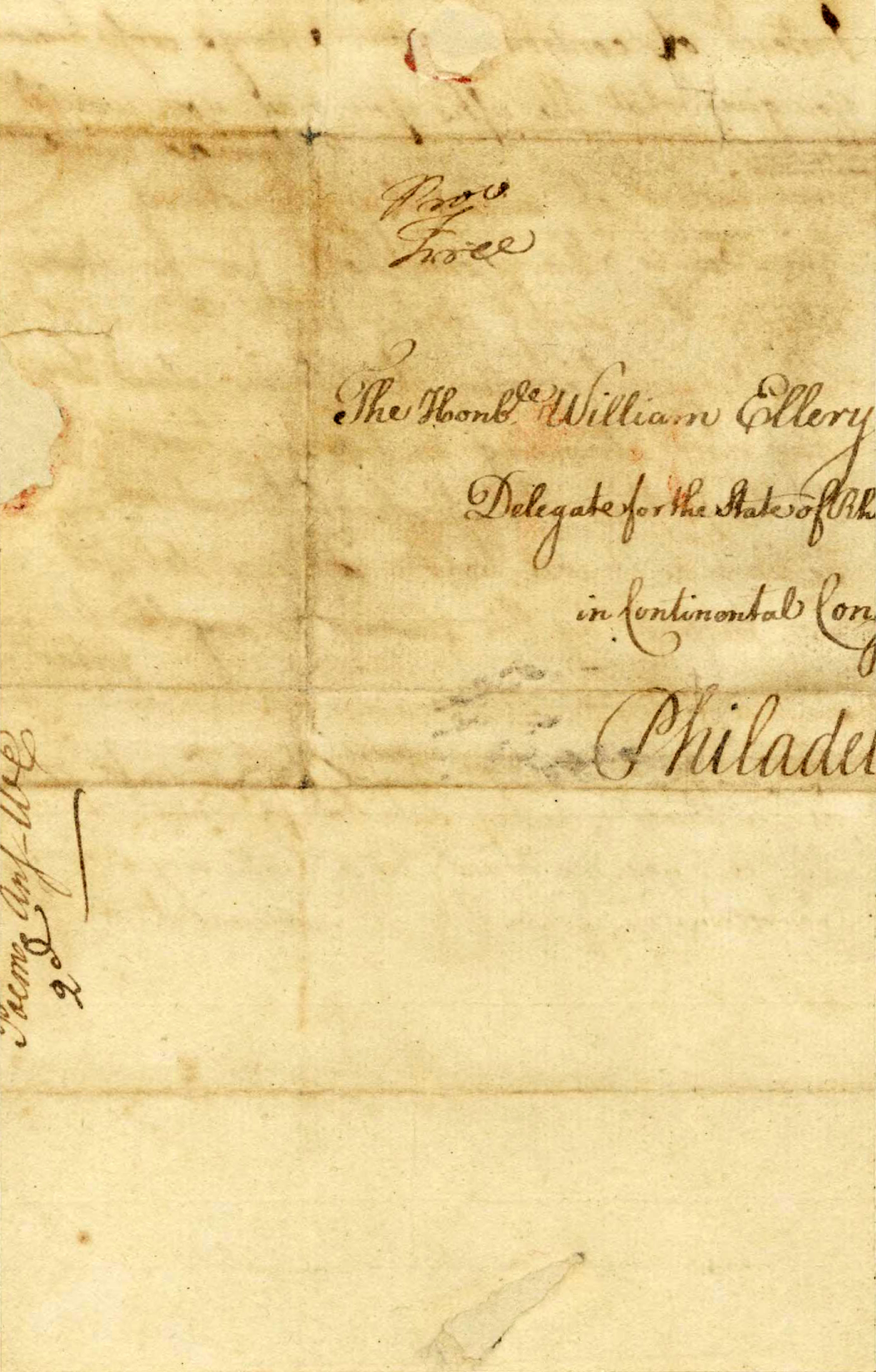
George Wythe returned to the Second Continental Congress in Philadelphia sometime in mid-September, 1776.[1] By November, Congress was facing a split caused by the northern states offering additional pay to their soldiers, which the southern states could neither match nor afford. George Wythe, delegate from Virginia, addressed a short, humorous poem to William Ellery of Rhode Island, suggesting that the "Yankees" generosity would ruin Congress's efforts. Ellery responded in kind, and the two exchanged verses until Wythe left Congress to return to the Virginia Convention, in December.
The manuscripts were recognized in the collection of the Boston Public Library by W. Edwin Hemphill, who published an article on them in 1952: "George Wythe Courts the Muses: In Which, to the Astonishment of Everyone, That Silent, Selfless Pedant Is Found to Have Had a Sense of Humor."[2]
In 2013 the manuscript was digitized by the Boston Public Library, and made available in the Internet Archive.[3]
Contents
- 1 Manuscript text, November-December 1776
- 1.1 "A Member of the Antinovanglian Faction to W. E.," by George Wythe (VA)
- 1.2 "A Novanglican to G.W.," by William Ellery (RI)
- 1.3 "Instead of Controlling Our Mary's Cross Humor," by William Ellery
- 1.4 "For Farms in Utopia, the Moon, or Some Fairyland," by George Wythe
- 1.5 Epigram, by William Ellery
- 1.6 "With One Epigram, Though Well Hit Off" by George Wythe
- 1.7 "Unless You Will Take One Line for Your Ten," by William Ellery
- 1.8 "You've Not Only Quitted Your Arrear," by George Wythe
- 1.9 "The Gen'rous Idea Your Last Piece Expresses," by William Ellery
- 1.10 Martial, Epigram XII.47, in Wythe's hand
- 1.11 "Those with Whom the Powers of Government Are Entrusted," by George Wythe
- 1.12 "A Commissioner, to the People of Philadelphia," by William Ellery
- 1.13 Copy of Ellery's "A Commissioner, to the People of Philadelphia," in Wythe's Hand, with dialogue
- 2 See also
- 3 References
- 4 Further reading
- 5 External links
Manuscript text, November-December 1776
"A Member of the Antinovanglian Faction to W. E.," by George Wythe (VA)
|
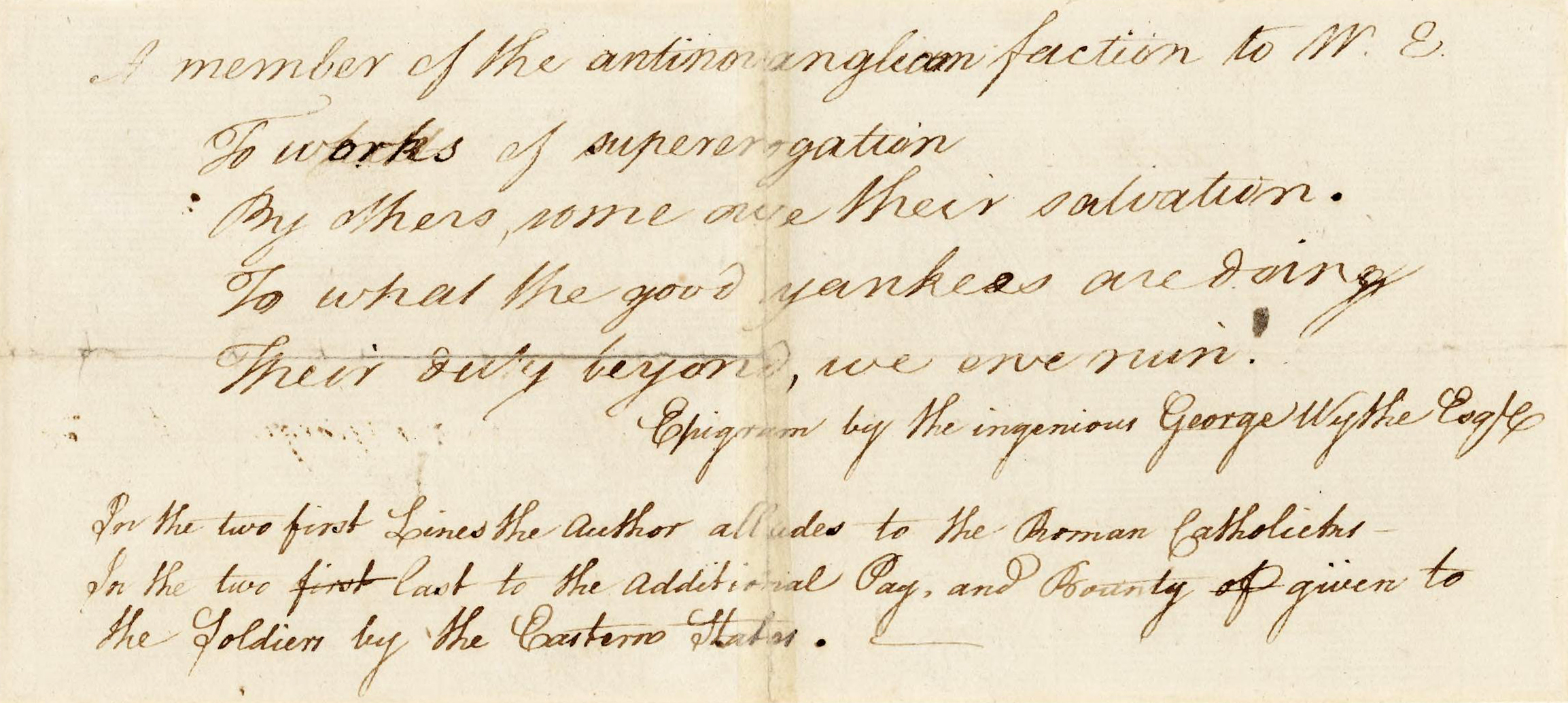 Manuscript endorsed on the reverse as "1st Poem", page seven of Poems on Witty Subjects in Congress, from the Boston Public Library's American Revolutionary War Manuscripts Collection. |
"A Novanglican to G.W.," by William Ellery (RI)
|
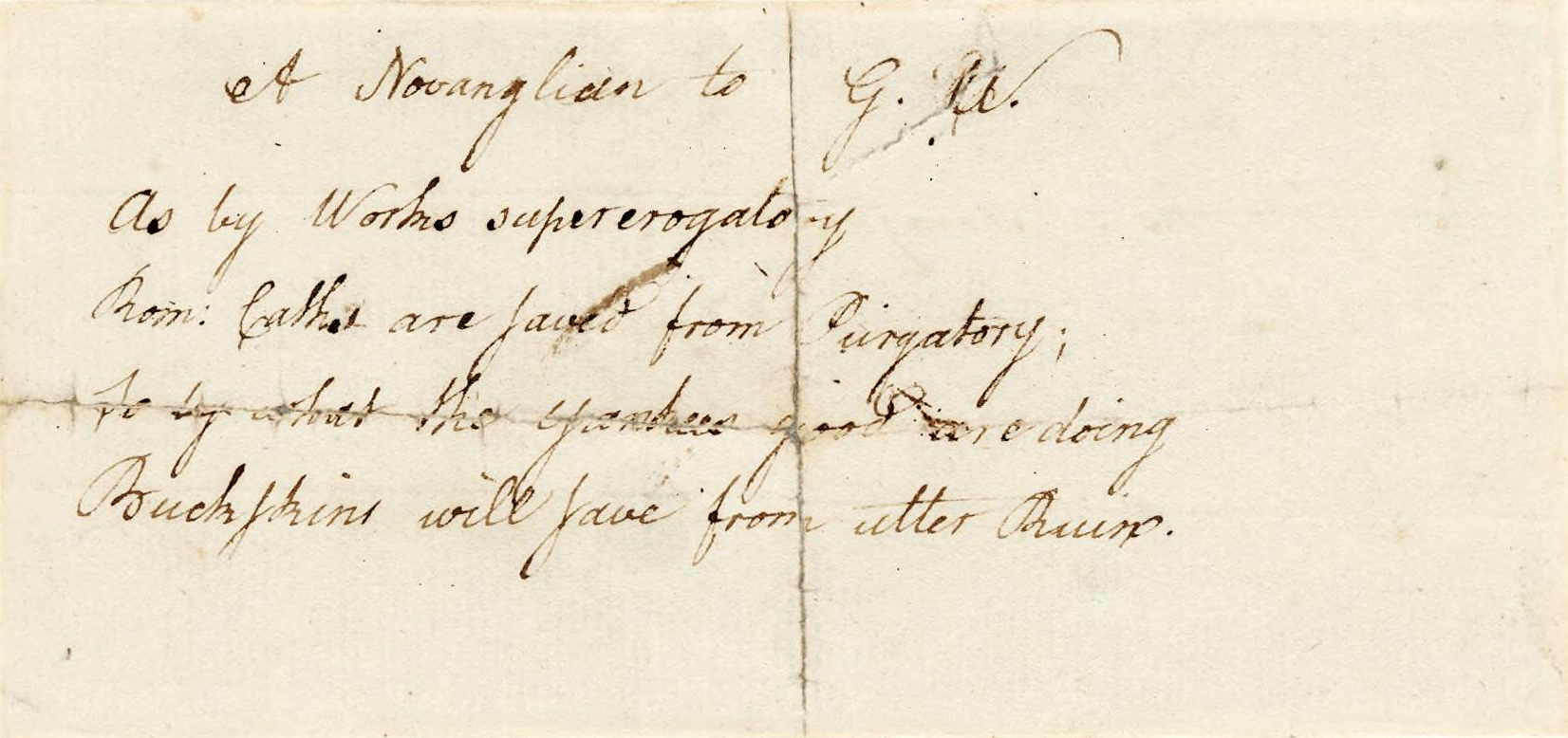 Endorsed on the reverse as "To G. Wythe / Answer to / 1.st Poem", page three of Poems on Witty Subjects in Congress, from the Boston Public Library's American Revolutionary War Manuscripts Collection. |
"Instead of Controlling Our Mary's Cross Humor," by William Ellery
|
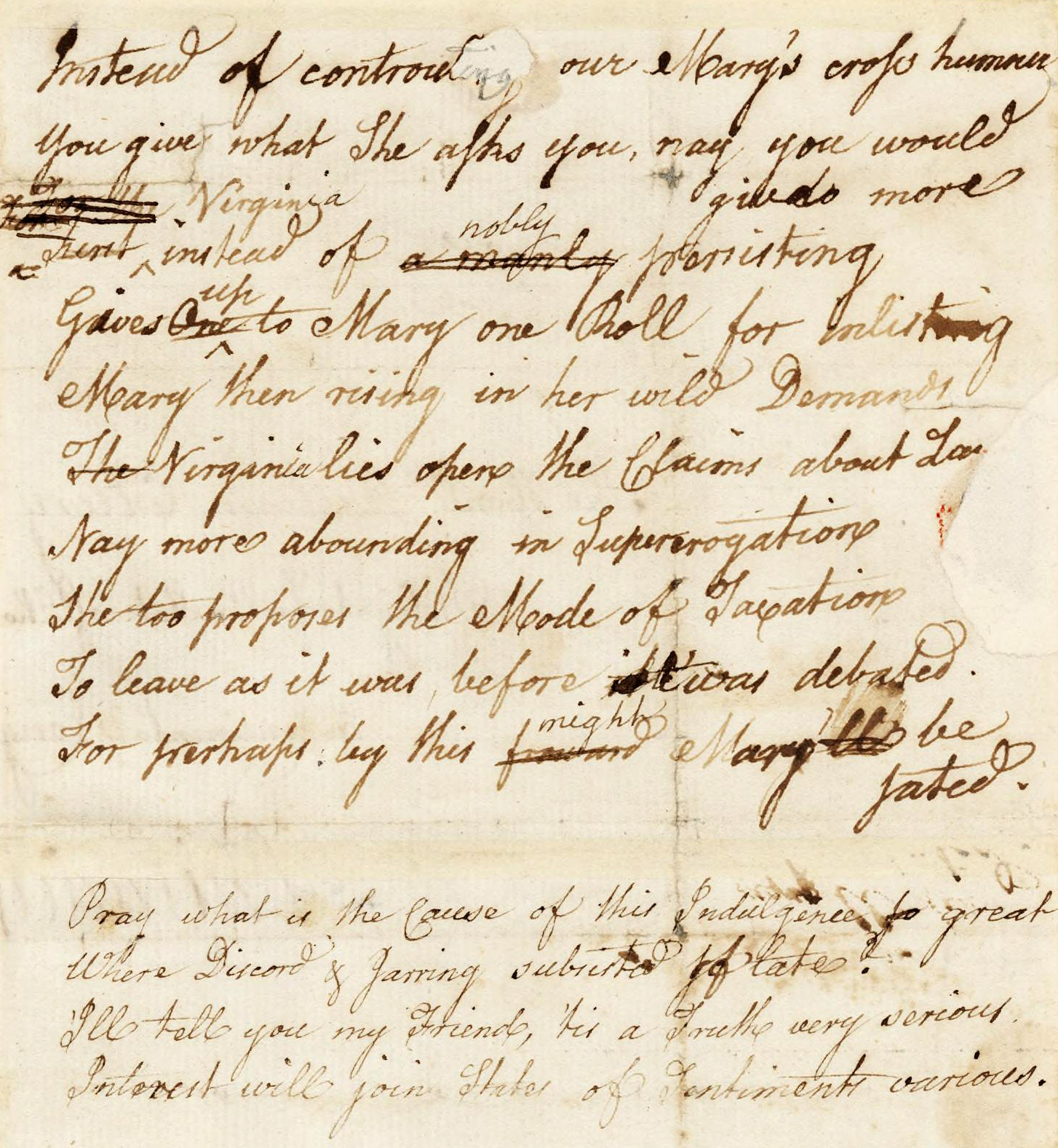 Manuscript endorses as "Poem Ans — WE / 2d", page five of Poems on Witty Subjects in Congress, from the Boston Public Library's American Revolutionary War Manuscripts Collection. |
"For Farms in Utopia, the Moon, or Some Fairyland," by George Wythe
|
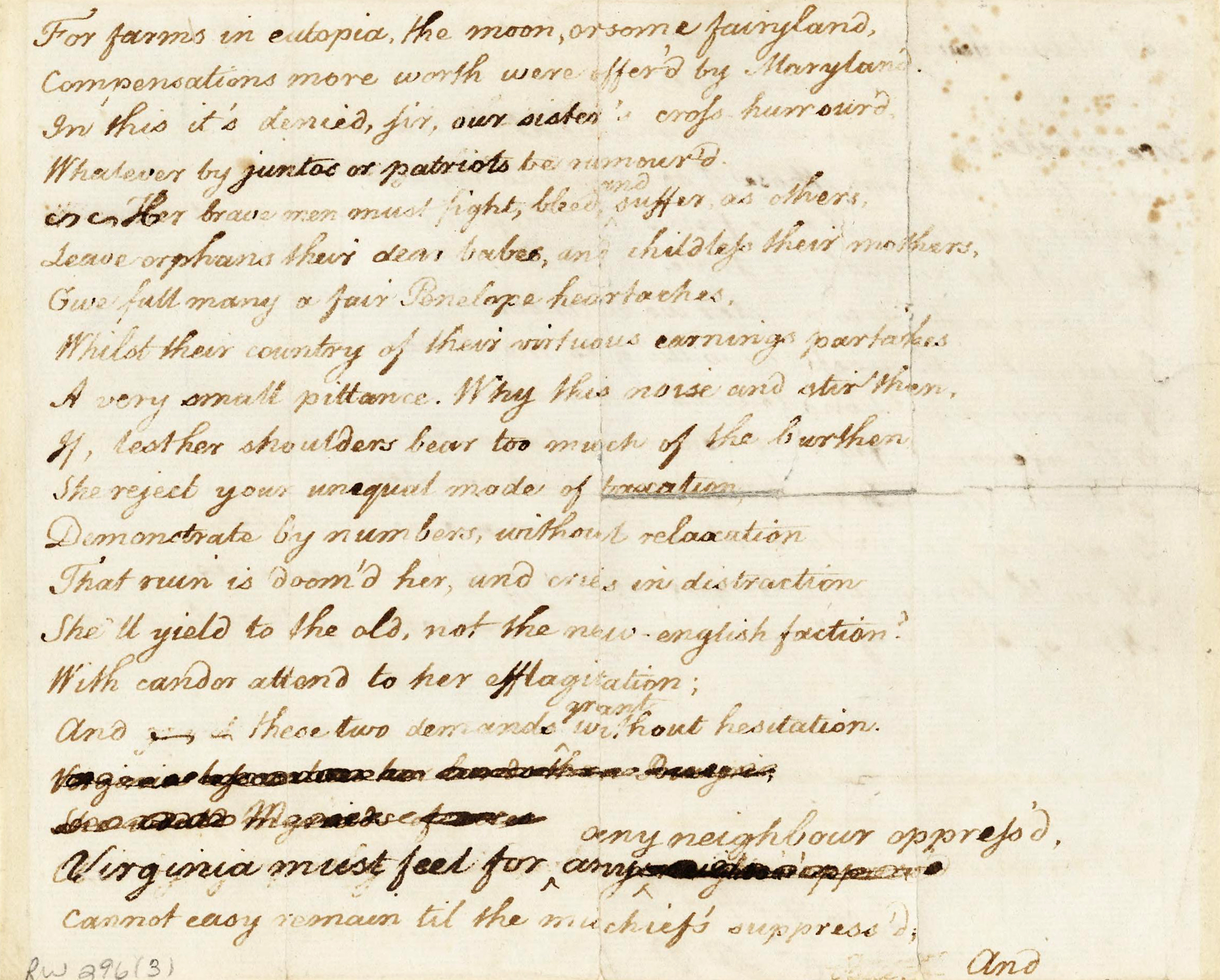 Page nine of Poems on Witty Subjects in Congress, from the Boston Public Library's American Revolutionary War Manuscripts Collection. | |
|
And if slaves you include in your capitation, |
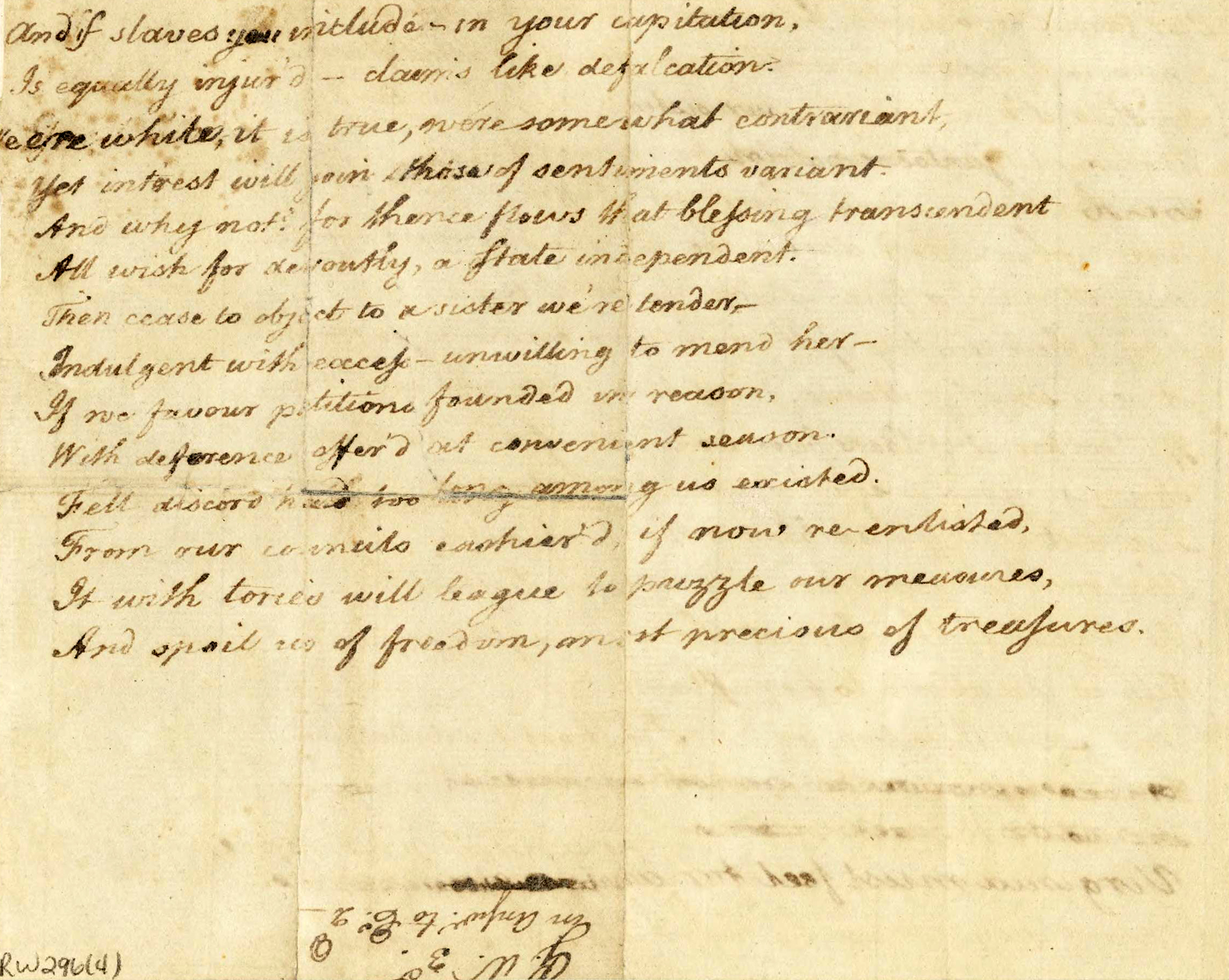 Manuscript endorsed as "G.W. 3d. / in Answr. to E.s 2d", page ten of Poems on Witty Subjects in Congress, from the Boston Public Library's American Revolutionary War Manuscripts Collection. |
Epigram, by William Ellery
|
"With One Epigram, Though Well Hit Off" by George Wythe
|
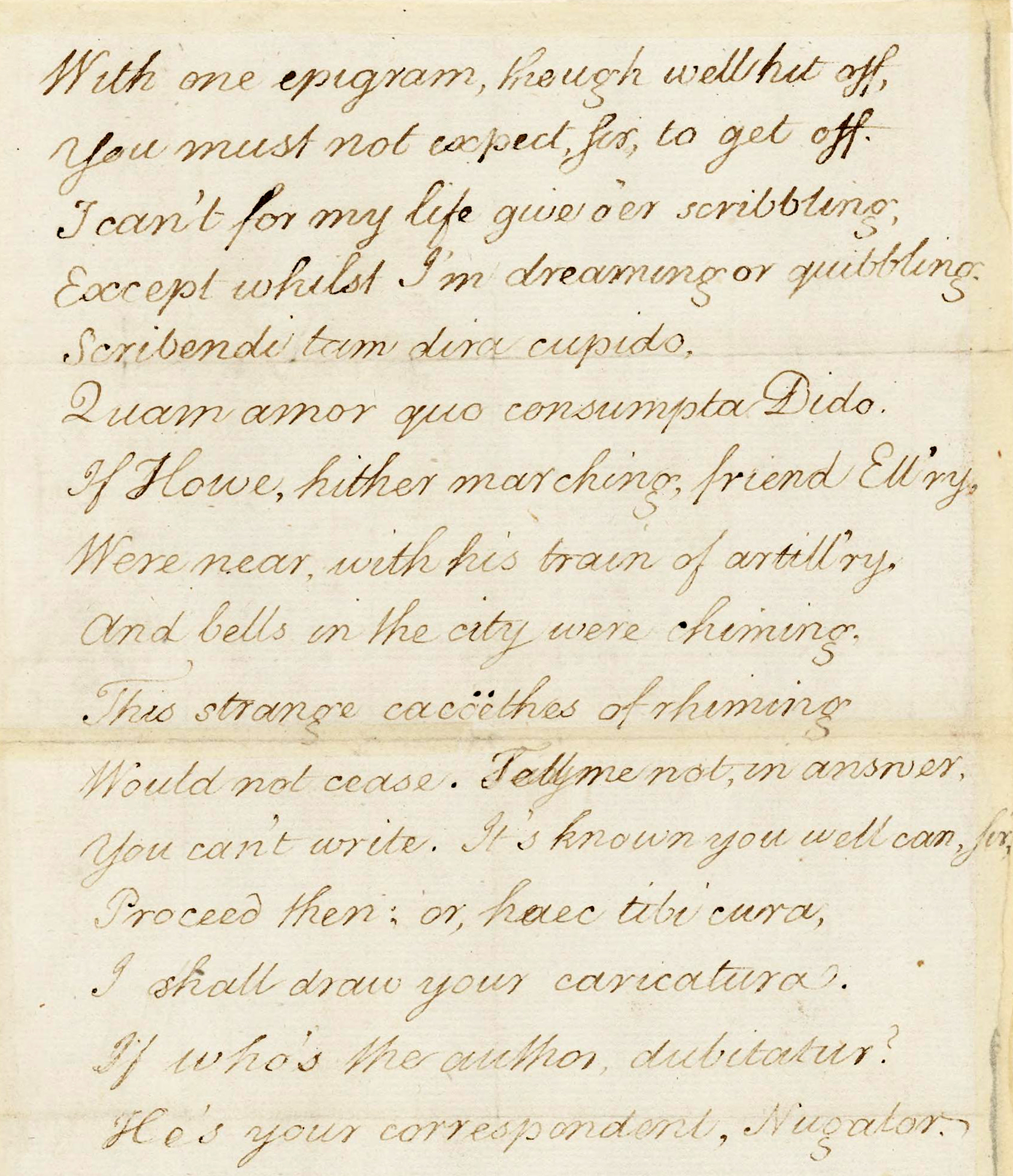 Manuscript endorsed |
"Unless You Will Take One Line for Your Ten," by William Ellery
|
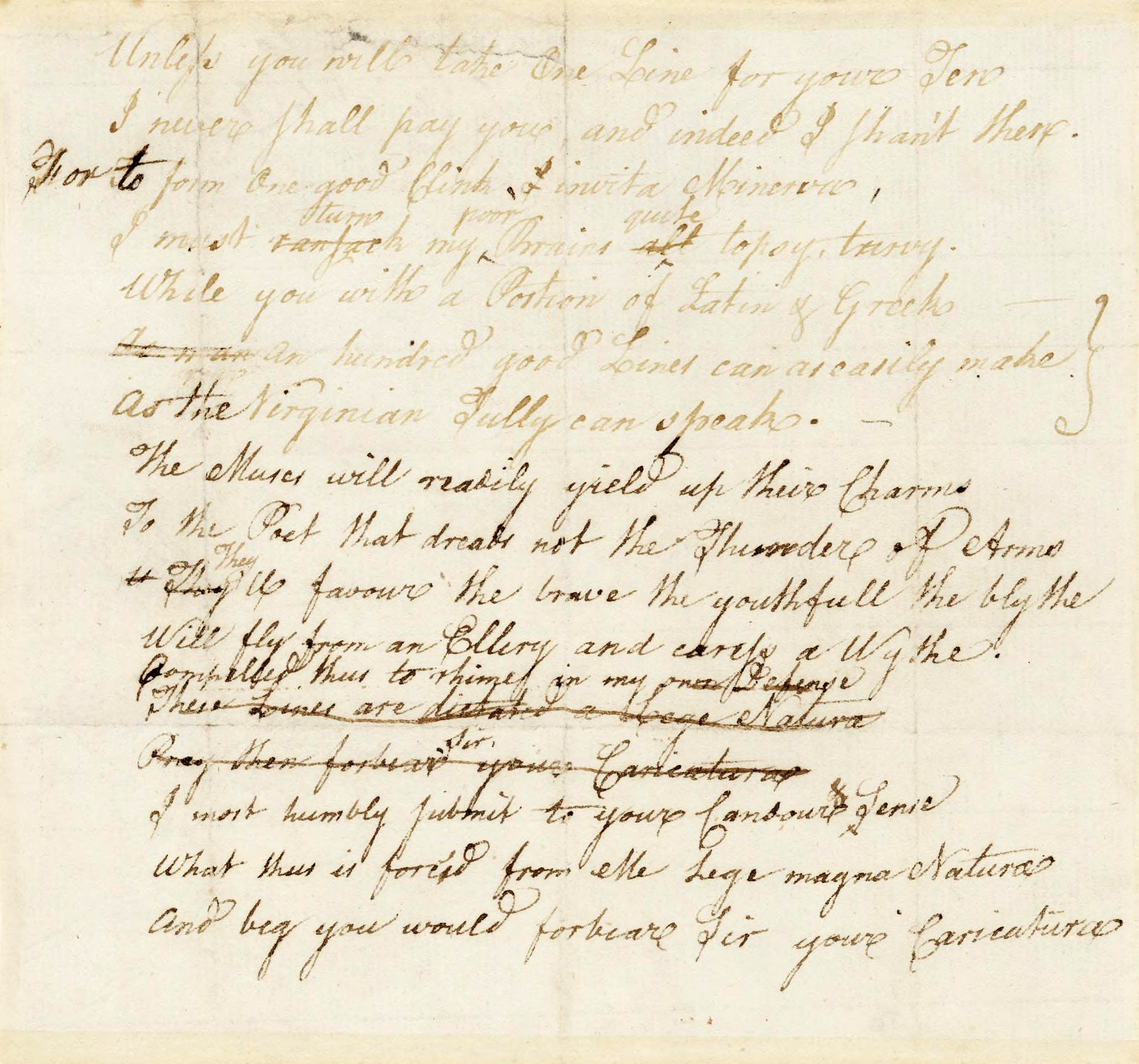 Manuscript endorsed "Answer E to / the Answr. to 4", page twenty-three of Poems on Witty Subjects in Congress, from the Boston Public Library's American Revolutionary War Manuscripts Collection. |
"You've Not Only Quitted Your Arrear," by George Wythe
|
|
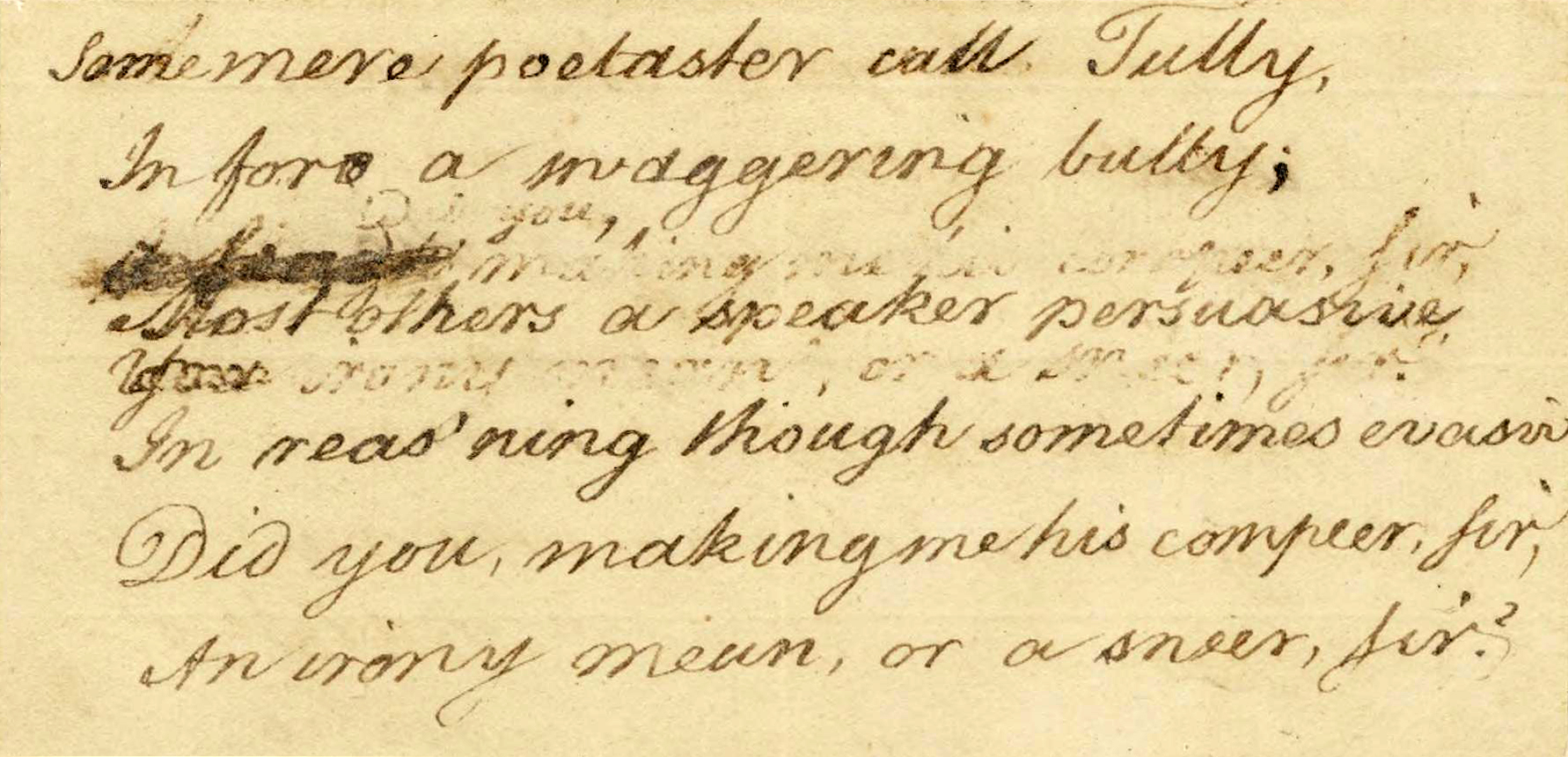 Manuscript endorsed "Poem W.5", page sixteen of Poems on Witty Subjects in Congress, from the Boston Public Library's American Revolutionary War Manuscripts Collection. |
"The Gen'rous Idea Your Last Piece Expresses," by William Ellery
|
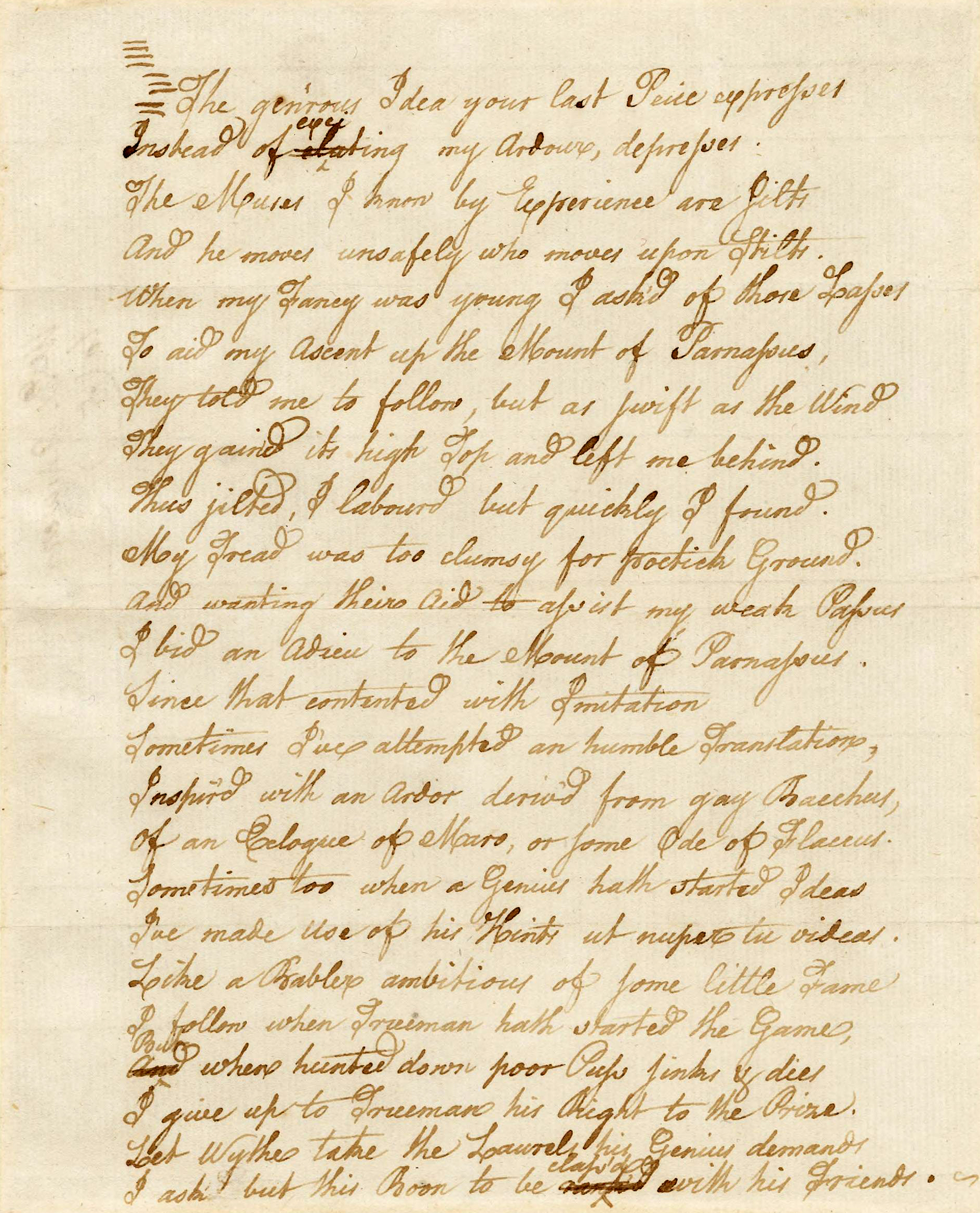 Manuscript endorsed "WE. Answer / to 5", page twenty-five of Poems on Witty Subjects in Congress, from the Boston Public Library's American Revolutionary War Manuscripts Collection. |
Martial, Epigram XII.47, in Wythe's hand
In his 1952 article, Edwin Hemphill suggests that this scrap may have been sent by Wythe in a 1778 letter to Samuel Adams, asking him to share an enclosure with William Ellery, whom Wythe had not heard from since leaving Philadelphia in December, 1776.
|
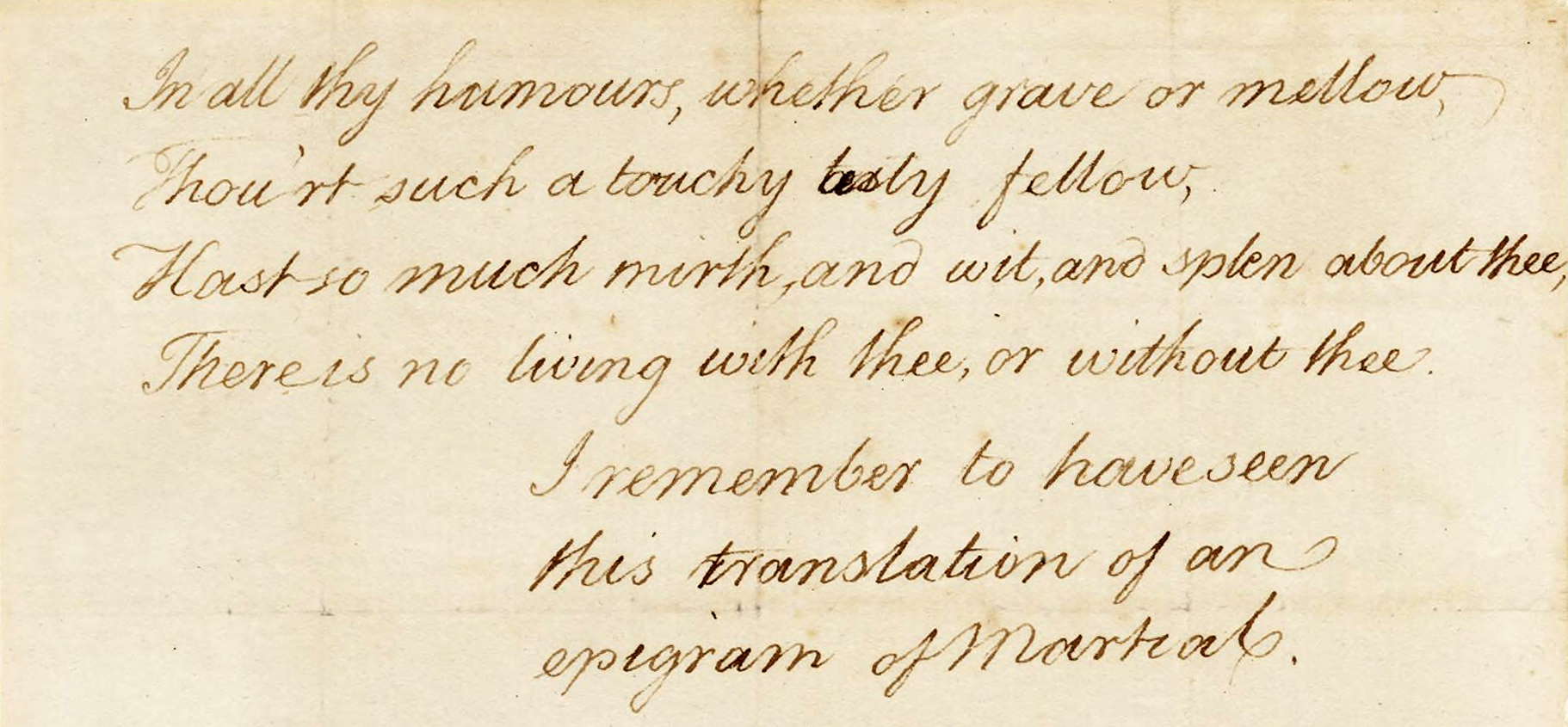 Page thirteen of Poems on Witty Subjects in Congress, from the Boston Public Library's American Revolutionary War Manuscripts Collection. |
"Those with Whom the Powers of Government Are Entrusted," by George Wythe
In this mix of prose and verse, Wythe seems to be trying to bring to light some complaint with Congress regarding a late ballot (perhaps with a remonstrance toward their agreement of secrecy), which he entreats the "college of censors" to inquire upon, despite one of the persons involved being as respected as Nestor of Greek mythology (but false as Milton's Belial):
|
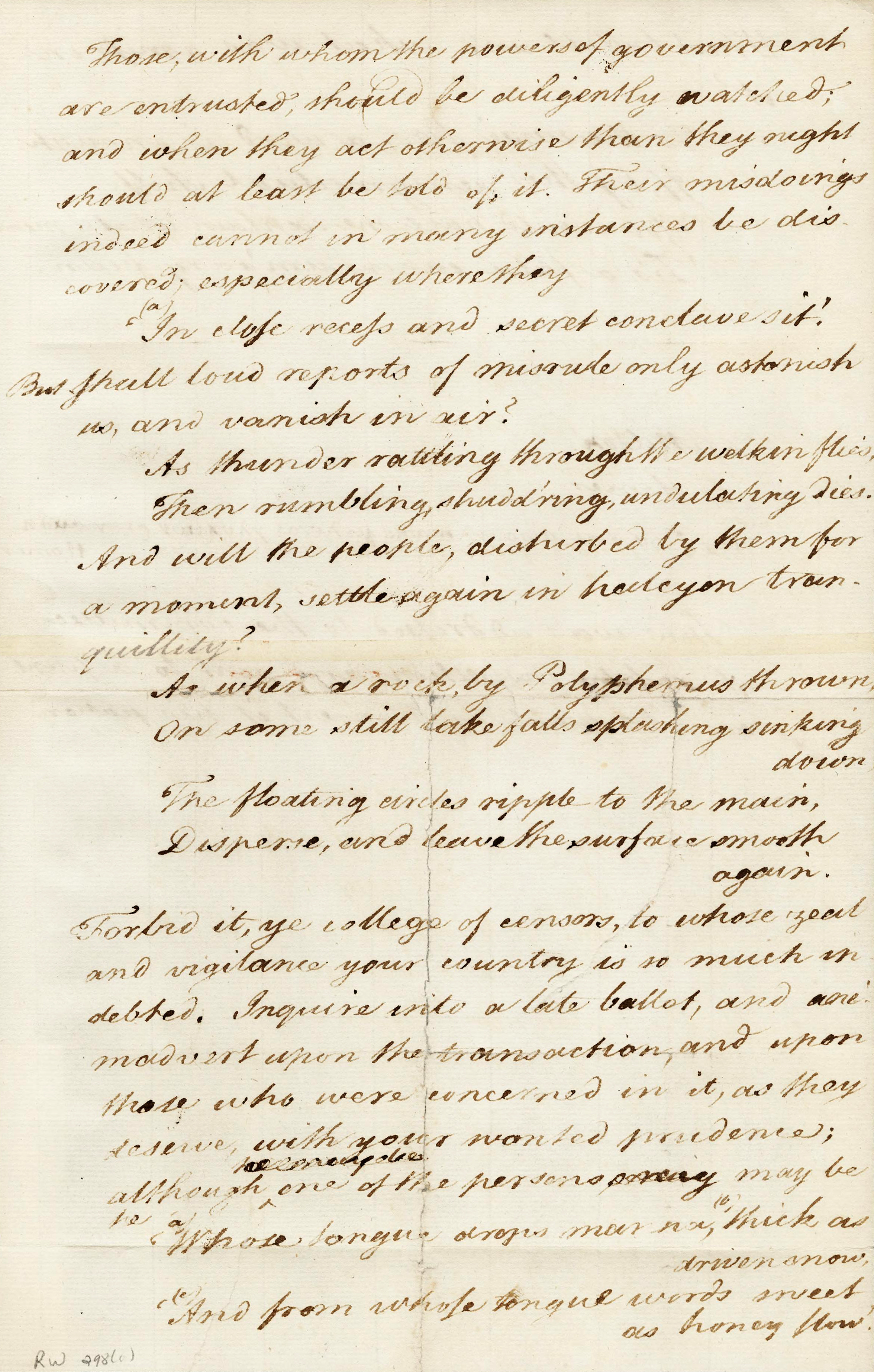 Page nineteen of Poems on Witty Subjects in Congress, from the Boston Public Library's American Revolutionary War Manuscripts Collection. | |
|
"A Commissioner, to the People of Philadelphia," by William Ellery
In this poem, Ellery chastises the conservative position of Andrew Allen, delegate from Pennsylvania, for his commonwealth's reluctance to support independence from Great Britain. The first letter of each line spells out "ANDREW ALLEN" (emphasized here).[23] Ellery and Wythe apparently attempted to get the poem published, as there is another copy in Wythe's handwriting with the lines transposed to avoid obvious "libellus famosos" (libel), and a dramatized dialogue with a reluctant printer:
|
Copy of Ellery's "A Commissioner, to the People of Philadelphia," in Wythe's Hand, with dialogue
|
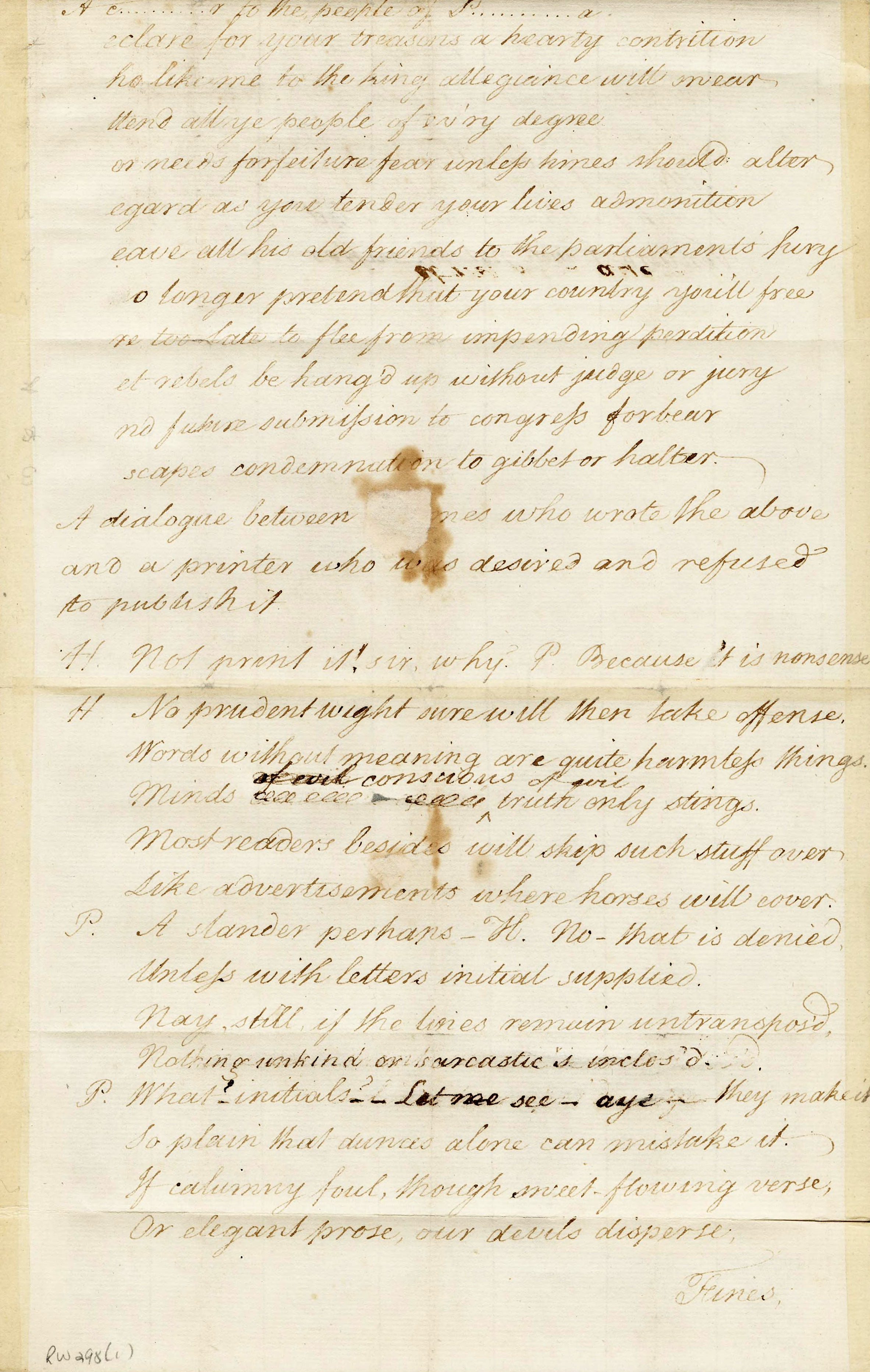 Page nineteen of Poems on Witty Subjects in Congress, from the Boston Public Library's American Revolutionary War Manuscripts Collection. | |
|
See also
References
- ↑ The exact date of Wythe's arrival in Philadelphia is not known. Wythe's signature does not appear on a letter from the Virginia delegates to the Pennsylvania delegates dated September 12, 1776, regarding a temporary border between the two commonwealths (Peter Force, American Archives, 5th ser. (Washington, D.C.: M. St. Clair and Peter Force, 1851) 2:42; but Josiah Bartlett, in a letter to William Whipple dated September 14, reports "Mr. Wythe is come to Congress." Edmund C. Burnett, ed. Letters of Members of the Continental Congress, vol. 2, July 5, 1776 to December 31, 1777 (Washington, D.C.: Carnegie Institution of Washington, 1921), 89.
- ↑ W. Edwin Hemphill, "George Wythe Courts the Muses," William and Mary Quarterly 3rd ser., 9, no. 3 (July 1952), 338-345.
- ↑ Poems on witty subjects in Congress (manuscript), by Ellery, William, 1727-1820; Wythe, George, 1726-1806; Boston Public Library, American Revolutionary War Manuscripts Collection.
- ↑ "Novanglian": New Englander.
- ↑ "Dire desire to write," paraphrase of Virgil, Aeneid, Book V, line 721.
- ↑ "The love which consumed Dido," Queen of Carthage.
- ↑ General William Howe, (1729 – 1814), Commander-in-Chief of British forces during the American Revolutionary War, captured Philadelphia in September, 1777.
- ↑ Ovid, Ex Ponto III, xxxvi.
- ↑ Dubitatur: "It is doubted."
- ↑ Jester, clown.
- ↑ Defy nature, literally "go against Minerva's will." Cicero, De Officiis, I, 31, 110.
- ↑ Wythe is a Virginian Cicero: Marcus Tullius Cicero.
- ↑ A great law of Nature.
- ↑ Classical Greek cry of exultation or triumph, traditionally addressed to Apollo the healer.
- ↑ Bawbee: a Scottish half-penny.
- ↑ "As of late, you see."
- ↑ A translation matching Wythe's version of Marcus Valerius Martialis' epigram 12.47, translated by Joseph Addison, appeared in The Spectator on May 18, 1711:
Difficilis, facilis, jucundus, acerbus es idem,
Nec tecum possum vivere, nec sine te.In all thy humours, whether grave or mellow,
Thou'rt such a touchy, testy, pleasant fellow;
Hast so much wit, and mirth, and spleen about thee.
There is no living with thee, nor without thee.An "odd volume" of The Spectator is listed in Thomas Jefferon's inventory of Wythe's library, among the books given to his son-in-law, Thomas Mann Randolph.
- ↑ Milton's demonic council in Paradise Lost, Book I, lines 792-797: "But far within, / And in their own dimensions, like themselves, / The great seraphic lords and cherubim/In close recess and secret conclave sat; / A thousand demigods on golden seats / Frequent and full."
- ↑ Milton, Paradise Lost, Book II, lines 112-113: "On the other side uprose / Belial, in act more graceful and humane. / A fairer person lost not Heaven; he seemed no / For dignity composed, and high exploit,/But all was false and hollow, though his tongue / Dropped manna, and could make the worse appear / The better reason, to perplex and dash / Maturest counsels...."
- ↑ Homer, Iliad, Book XII, lines 278-279: Stones are volleyed by the Trojans and Achaeans "as flakes of snow fall thick on a winter's day."
- ↑ Homer's admiration of Nestor, in the Iliad, Book I, line 249: "But Atreides / raged still on the other side, and between them Nestor / the fair-spoken rose up, the lucid speaker of Pylos, / from whose lips the streams of words ran sweeter than honey."
- ↑ Wythe translates this line of Homer as "And from whose tongue words sweet as honey flow."
- ↑ Imogene Brown, American Aristides (Rutherford N.J.: Fairleigh Dickinson University Press, 1981), 157, 166 n189.
- ↑ Libellus famosos: libel.
- ↑ A reference to the colonial punishment of cutting off ears?
- ↑ Edmund Curll (c. 1675 – 1747), whose name was synonymous with "unscrupulous publication and publicity."
Further reading
- Fowler, William M. William Ellery: A Rhode Island Politico and Lord of Admiralty. Metuchen, NJ: Scarecrow Press, 1973.
External links
- American Revolutionary War Manuscripts at the Boston Public Library, Internet Archive.
- Boston Public Library, Special Collections.
- Read these poems in the Internet Archive.
